

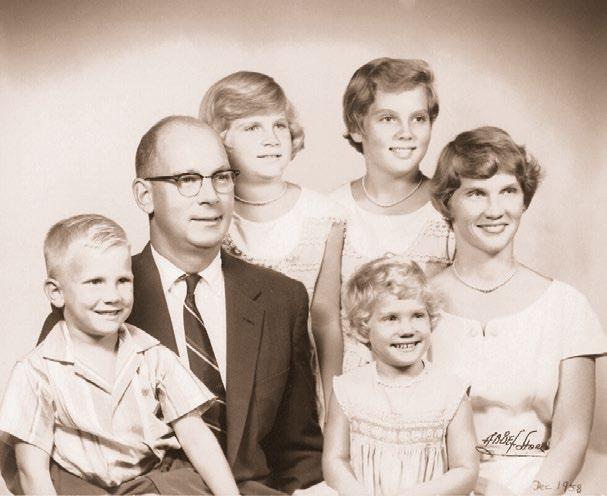
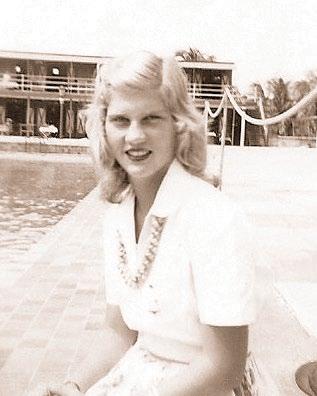


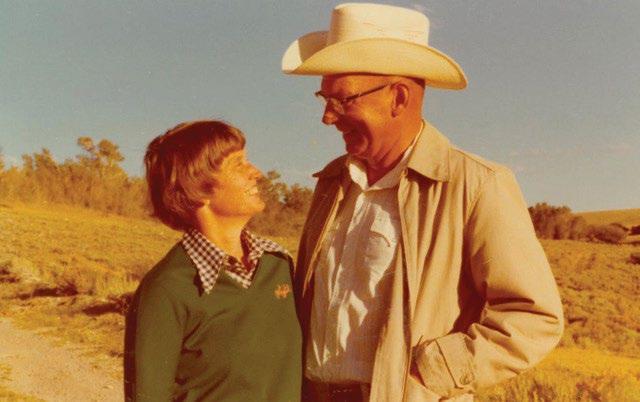
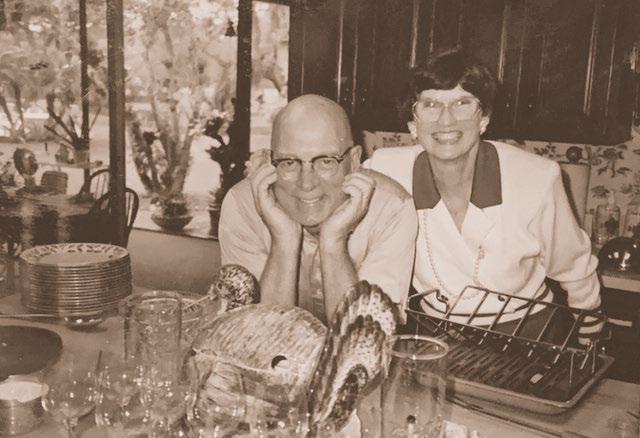
THE MAGAZINE OF THE NATIONAL FRANCHISEE ASSOCIATION, INC. www.nfabk.org Flame 2020 Issue 2 page 22 Nancy McLamore (1926-2020): BURGER KING’s First Lady


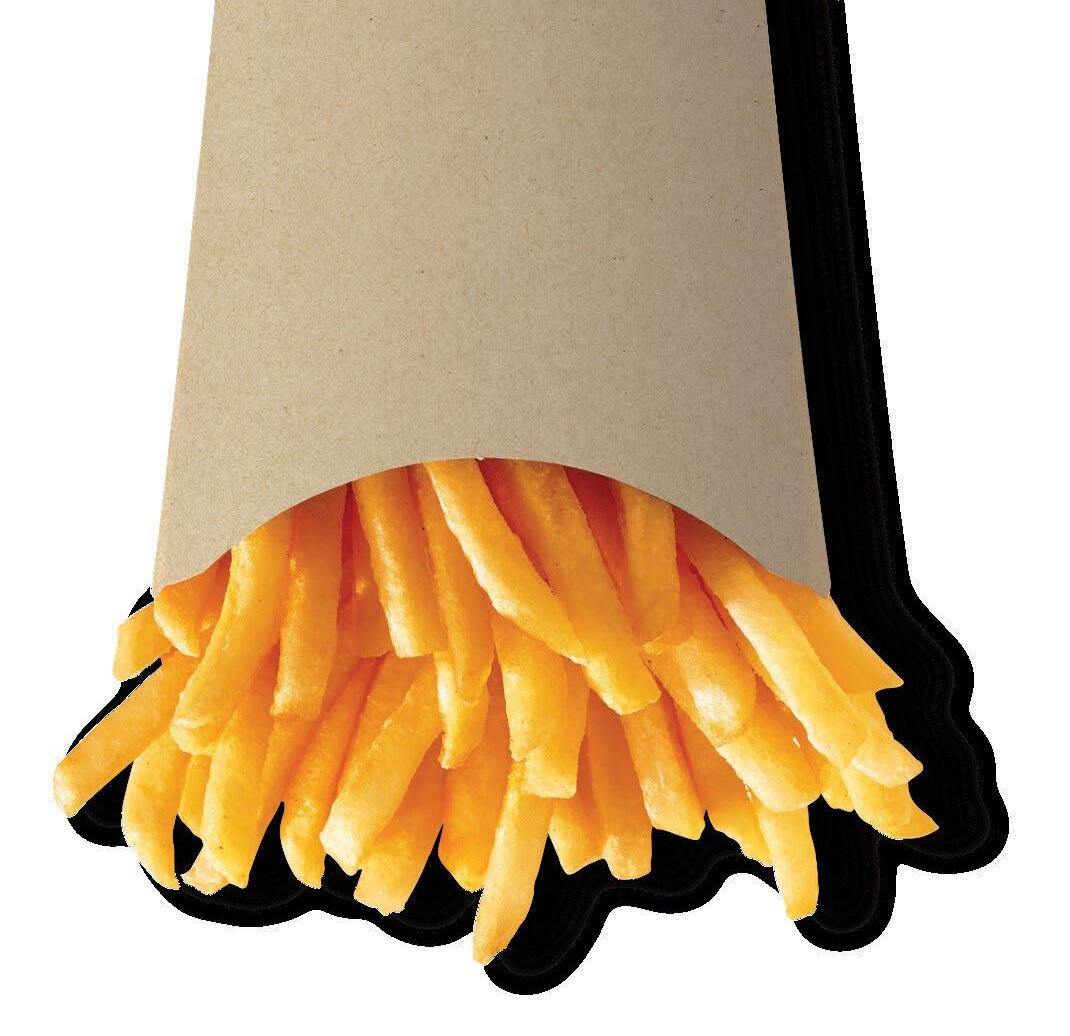
In uncertain times, innovation is king. WE’RE HERE TO HELP. ©2020 J.R. Simplot Company From innovative LTO concepts to new, on-trend products, count on Simplot for the insights, supply and support you need to keep patrons coming back. potatoes | avocados | fruits | vegetables | grains www.simplotfoods.com Watch our BK thank you video!
NFA Editorial Board
Drew Paterno
Executive Editor dpatern@aol.com
201-445-0055
Jessica Loeding
Editor-in-Chief jessical@nfabk.org
Sean Ireland
Managing Editor seani@nfabk.org
Rachel Jackson
Associate Editor rachelj@nfabk.org
Advertising Sales
Jeff Reynolds Director of Business Partner Relations jeffr@nfabk.org
678-797-5163
NFA Officers
Dan Fitzpatrick Chair
Jim Froio Vice Chair
Drew Paterno Secretary
Steve Keith Treasurer
Steve Lewis Chair Emeritus
Christy Williams
CEO
NFA Board of Directors
CANADIAN FRANCHISEE ASSOCIATION

Mike Kitchingman
FLORIDA/CARIBBEAN
Glenn Levins
GREAT MIDWEST
Adam Velarde
Matt Carpenter
GREAT WESTERN
Nasser Aliabadi
Gary Geiger
INTERNATIONAL HISPANIC
FRANCHISEE ASSOCIATION
Guillermo Perales
LARGE FRANCHISEE GROUP
Patrick Sidhu
METRO NEW YORK
Amir Syed
MID-ATLANTIC
Gary Andrzejewski
MID SOUTH
Kevin Newell
Mike Callahan
Brent Northrop
Larry Stokes II
MINORITY FRANCHISEE ASSOCIATION
Camille Lee-Johnson
MOUNTAIN
Amir Allison
NEW ENGLAND
Brek Kohler
SOUTHERN CALIFORNIA
Shirley Humerian
SOUTHWEST
Michael Laird
OHIO RIVER
Matt Herridge
Bill Keller
Design and Layout
KT Graphic Design ktgraphicdesign@gmail.com
TABLE OF CONTENTS
2020 Issue 2
ON THE COVER
As the wife of BURGER KING® co-founder Jim McLamore, Nancy McLamore was often considered the brand’s first lady. With her passing in May, family and friends recalled the important role she played as her husband’s partner, company ambassador and so much more. Read more about this remarkable woman on page 22.

HEADQUARTERS
First Lady
26 BK Founder’s Book Being Reissued With New Material by Sean Ireland
28 New Dashboards Offer Home Delivery Insights contributed by RSI
30 BURGER KINGSM Family Fund: A Helping Hand During a Global Pandemic contributed by the BURGER KING McLAMORESM Foundation
32 Communications Take On Added Importance in Wake of COVID-19 and Civil Unrest by Douglas H. Duerr, Elarbee Thompson
34 Six Employee Communication Strategies During Times of Crisis by Dennis Snow, Snow & Associates Inc.
36 Balance the Opposites by Dan Coughlin, The Coughlin Co.
38 Making the Most of Your Business’s Risk Management contributed by Lockton Cos.
40 Productive Worry Versus Unproductive Worry: Six Ways to Make Worrying Work for You by Laura Stack, The Productivity Pro®
42 Optimally Manage Cash Flow With a Financial Team by Charlie Koch, Prism Financial Group, a related company of Mize Restaurant Group
1701 Barrett Lakes Blvd. NW, Suite 180 Kennesaw, GA 30144 Phone: 678-797-5160 • Fax: 678-797-5170 www.nfabk.org The National Franchisee Association, Inc., comprising regional BURGER KING franchisee associations, publishes the Flame. Any reproduction, in whole or in part, of the contents of this publication is prohibited without prior written consent of the National Franchisee Association, Inc. All Rights Reserved. In keeping with our commitment to the environment, this publication is printed on certified, environmentally friendly recycled paper using eco-friendly inks. Copyright ©2020 • Printed in the U.S.A.
Columns 02 As We Look to the Future, We Cherish the Memory of a BK Pioneer by Dan Fitzpatrick, NFA chair 04 Elevanta and NFA Services Can Help You Overcome Business Challenges by Christy Williams, CEO Departments 06 NFA Member News 10 Calendar of Events 13 One Topic: 10 Facts 15 Look, Listen, Read Directories 12 Support the Vendors That Support Your Association 44 Editorial Calendar and Advertisers Guide Features 14 Spotlight on the 116th Congress: Rep. Chip Roy (R-TX-21) 16 ‘A Penny Business:’ Franchisees Battle Rising Food Costs by Sean Ireland, NFA associate director of communications 20 Healthy Companies Closely Manage P&L Statements by Sean Ireland 22 Nancy McLamore (1926-2020): BURGER KING’s
FROM THE CHAIR
As We Look to the Future, We Cherish the Memory of a BK Pioneer
This issue of Flame magazine is paying tribute to the memory of Nancy McLamore, the wife of Jim McLamore, one of the co-founders of the BURGER KING® brand. Mrs. McLamore was 93 and died May 23.
Nancy was a wonderful woman who supported her husband, Jim McLamore, in his dream of growing the BURGER KING brand from its infancy to a national brand. Mrs. McLamore was known for her grace, charity and kindness. She and Jim made an important impact on BURGER KING, the Miami, Florida, community and many other institutions, including the BURGER KINGSM McLamore Foundation. Through the foundation, millions of dollars in educational support for high school students and BURGER KING employees, as well as support for the entire BURGER KING family, has been achieved.
The McLamores often attended NFA events. Jim was a great motivational speaker and offered us a wealth of business and institutional knowledge, and Nancy was a warm presence who could make a stranger feel like a close friend within minutes.
Jim and Nancy were important to our brand for more than being its co-founders. Of course, it starts with their passion for a mission to serve great food to guests at
reasonable prices, but they contributed to the BK® system in many ways. After selling the company in 1967, Jim remained as its CEO and president for several years. Later, he served as a consultant to the brand in the 1980s and 1990s, and both his son and one of his sons-in-law were franchisees. Nancy was there every step of the way.
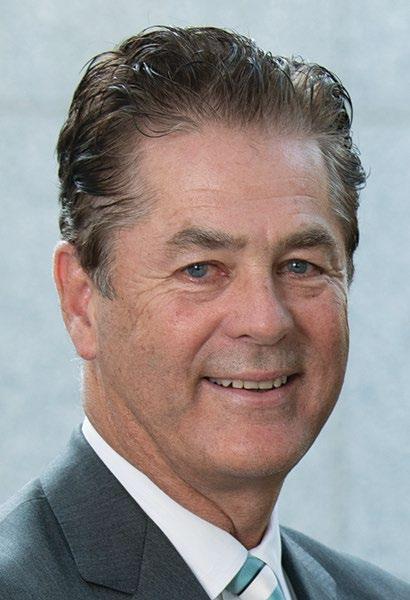

The McLamores often attended NFA events. Jim was a great motivational speaker and offered us a wealth of business and institutional knowledge, and Nancy was a warm presence who could make a stranger feel like a close friend within minutes. She was often a fixture at our convention long after Jim’s death in 1996. She loved our BURGER KING brand and its people, who she called friends.
We owe much to these pioneers who not only set the foundation for today’s globally celebrated BURGER KING system, but also continued to advocate for a strong BK franchisee community as a critical ingredient for the brand’s recipe of success. We hope you read more about Nancy in the story that starts on page 22.
For over 30 years, the NFA has been the champion of the community that Nancy and Jim believed in so strongly, advocating for the interests of large and small-sized franchisees across the system. The mission of the NFA requires us to collaborate on issues that affect all of us. We work with Burger King Corp. to ensure our collective views are known on subjects such as marketing, menus, operations, restaurant development and image and to find solutions that are good for both groups. We offer a clear voice to the supplier community so that vendors can partner with us and ensure their products and services meet our needs. The NFA also promotes policies and laws favorable to entrepreneurship and the economic health of small businesses with our elected officials in Washington, D.C. We know Jim and Nancy always strongly supported the NFA
 by DAN FITZPATRICK
by DAN FITZPATRICK
and its mission.
2020 will be remembered as a year that has been more challenging to our industry than any other year in memory. The NFA has worked tirelessly with our franchisor, Burger King Corp., to develop meaningful relief measures for franchisees. We have consistently monitored and engaged on government relief bills and programs such as the Coronavirus Aid, Relief, and Economic Security (CARES) Act and the Paycheck Protection Program (PPP), suggesting improvements to those and other measures that have been important for our franchisees.
Together we have gotten through this, and clearly, there are challenges that await us. As we move forward, stay strong and remain engaged with the NFA. Just as Nancy and Jim McLamore were keys to BURGER KING’s past successes, together we will be just as important to its future ones. n
2 Flame | 2020 ISSUE 2
SAVE
March 9-12 | Cosmopolitan, Las Vegas
WHO SHOULD ATTEND: Franchisees | ARLs | System Suppliers

THE DATE! 2021 NFA LEAD Conference
Elevanta and NFA Services Can Help You Overcome Business Challenges



As our nation continues to struggle through the coronavirus pandemic, our business operations have all been challenged. The pandemic is an unprecedented disaster, touching off unforeseen problems in all facets of our businesses.
If there is a silver lining to the clouds of uncertainty that have been pushed over our organizations by the disease and the response to curtail it, it’s that unconventional times often lead to increased innovation and the development and use of unexpected solutions.
What do you do when there’s a new challenge you’ve never considered before? You find new ways to overcome the hurdle. In business, leaders often become willing to try solutions that they may not have considered when operations were running normally. Many times, those new ways of doing business work so well that they become permanent, even when the circumstances that led to their adoption ease.
In this way, crisis can become the progenitor for the successful evolution of some of your operations, allowing you to manage your businesses more efficiently and better serve your teams and customers.
Elevanta and the National Franchisee Association (NFA) offer services that many BURGER KING® owners might previously have considered unconventional, but under today’s circumstances provide unexpected advantages to them and their teams. Elevanta has developed many of these solutions through partnerships with industry-leading companies.
Among them are:
• Paycards: Through an agreement with rapid!, NFA offers one of the most comprehensive paycard programs available on the market. By using paycards to compensate employees, businesses eliminate paper checks, reduce costs and improve efficiency. Employees get a
flexible payment solution that frees them from having to deposit or cash paychecks, keeping them safer by eliminating unnecessary trips to their financial service provider.
• Payroll and accounting: NFA partner Mize CPAs Inc. offers the Elevanta Payroll & Accounting program, which provides a cost-effective solution for payroll processing from a full-service financial firm. The Mize CPAs program offers complete payroll processing, including many services for which others charge extra. You can outsource this time-consuming function and handle your biggest single expense more efficiently with this Elevanta program.
• Hiring and onboarding assistance: By working with TraitSet Hire, franchisees have access to a platform with hiring solutions such as Text-to-Apply and online job application processing, including behavioral assessments, that reduce faceto-face contact between managers and job candidates, keeping both groups safe. The program also offers customizable training and scheduling technology.
• Safety equipment: NFA’s preferred safety products partner, Front Line Sales, stocks and maintains safety products –including personal protective equipment – for the restaurant industry with singlesource ordering and customized programs that deliver the right products and services to your business with best-pricing strategies and dedicated account representatives. As restaurant dining rooms reopen and teams are rebuilt, having the necessary equipment and products to keep them and guests safe will be more important than ever.
• Energy procurement services: NFA members can benefit from our partnership with APPI Energy, a company that offers utility-based benefit programs in competitive deregulated areas. Analyze your utility accounts and get monthly reporting of your costs, savings and refund
by CHRISTY WILLIAMS
opportunities with no upfront fees. The savings may provide cash flow at a time when it has never been needed more.
If you have questions or would like more information about these services or the Elevanta Health or Elevanta Property & Casualty insurance programs, please contact us at 678-540-6203.
The NFA is dedicated to helping our members no matter the circumstances in the world around us. Curating and offering these services are important ways that we assist you to solve dilemmas and boost your businesses.
The challenges that we continue to face this year were unexpected. They’ve been painful in both human and economic costs. Though it remains unclear how much longer recovery will take, they present you with an opportunity to evaluate your organization and consider the new ways in which Elevanta and the NFA can help you clear the hurdles. You may discover that you can improve your operations in ways that far outlast the difficulties we face and lead to more success in the brighter future ahead. n
4 Flame | 2020 ISSUE 2
THE CEO
FROM
Your businesses are facing challenges in uncharted territory. To help, Elevanta Health deferred April health insurance premiums—estimated at $1.7 million—and provided annual participation refunds of over $300,000 to our members. That’s a combined total of $2 million we put back into the hands of members during a time when they needed it the most.
We care about your wellbeing. Contact us today for a custom quote.
memberservices@elevanta.com I elevantahealth.com/nfa I www.elevanta.com

= $1k in Refunds
= $1k in Deferred Premium
2020 ISSUE 2 | Flame 5
Ocedon Team Member Celebrates 25 Years With the Brand

José Lopez is the general manager at Ocedon’s BURGER KING® restaurant in Aurora, Colorado, and is celebrating more than 25 years with the brand. After moving to Colorado from California in 1993, he began working as a crew member at the Highlands Ranch restaurant. Lopez has served in all positions in the BK® restaurant, from kitchen crew and maintenance all the way up to his current position as general manager.
The Ocedon team, led by franchisees Ken and Elena Donahue, is proud to have a manager like Lopez working in its restaurant. Lopez’s co-workers have described him as an “all-around great manager who is exceptional at building and developing his team.”
His extensive experience in all

positions throughout the restaurant and his vast knowledge of the BK system make him a great asset to the team. Lopez is always hitting his target goals and achieving positive results. On his days off, he enjoys spending time with his family, especially his grandson, Mateo.
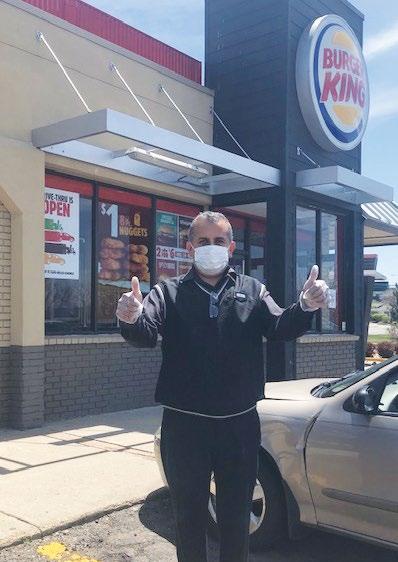
Recently, Lopez and his team prepared and donated meals to the Aurora Public School district staff, who provided meals to children and their families every day. These children would typically rely on breakfast and lunch at their schools, which were closed due to the coronavirus pandemic.
“On behalf of all of us in the OCEDON BK family, we thank you for all you do!” said Ken and Elena Donahue of Lopez. n
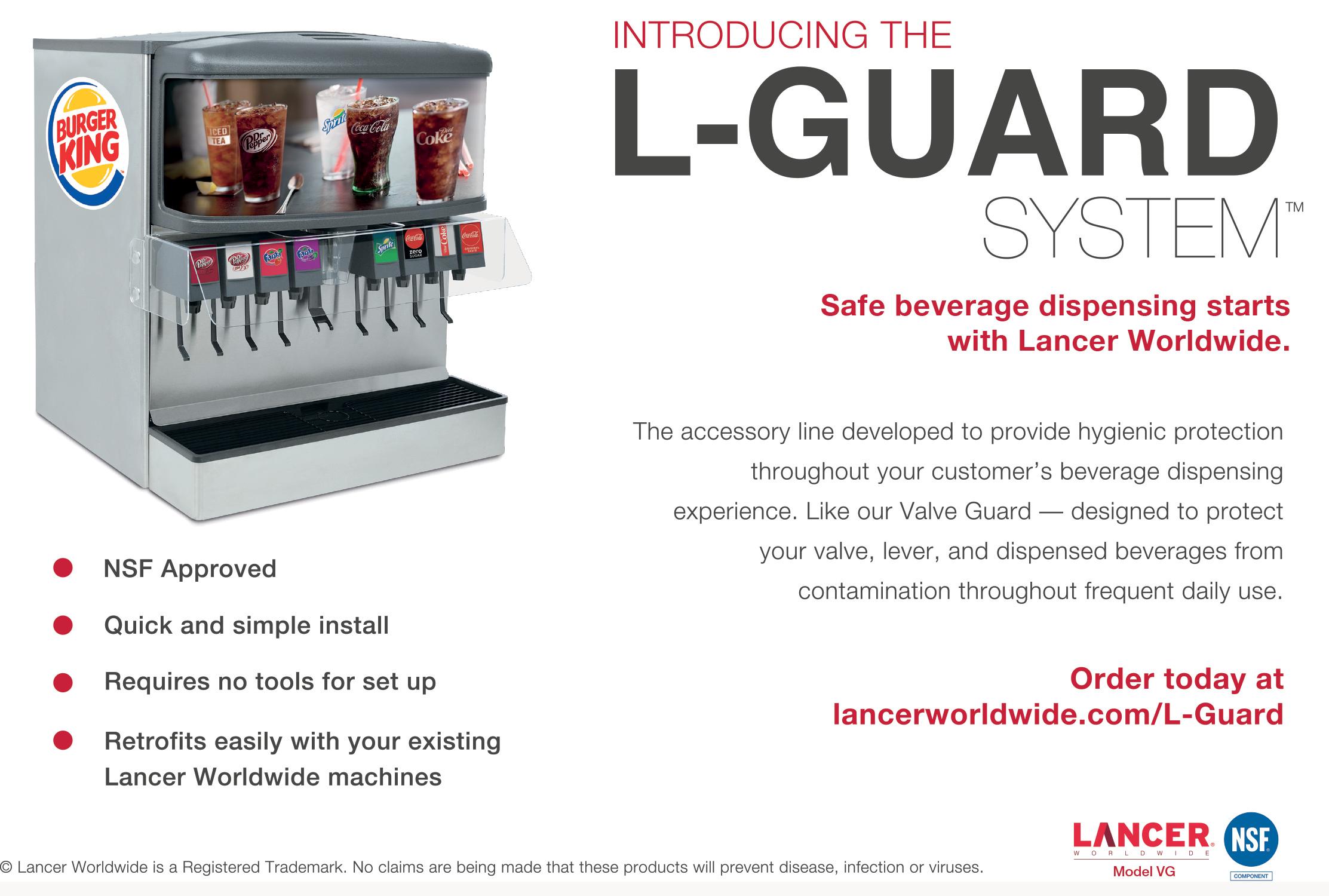
6 Flame | 2020 ISSUE 2 MEMBER NEWS
José Lopez has been working in the BK system for over 25 years.
BURGER KING Team Members in Phenix City, Alabama, Receive Surprise From Generous Guest
Schuster Enterprises’ BURGER KING® in Phenix City, Alabama, recently received an encouraging surprise. The restaurant, owned by Todd Schuster, had a guest come through the drive-thru on May 22 who was feeling quite generous.
During the peak of the COVID-19 pandemic, many restaurants were restricted to drive-thru only and team members had to ensure they were following strict safety and cleaning protocols. This guest wanted to give back to
these team members during an especially hard time for many.
The woman donated $2,000 in cash to the restaurant as an appreciation gift. The management team did not recognize her as a regular guest, but she mentioned that she simply wanted to “give back.” The woman said she is a small-business owner and appreciates all the incredible work the BURGER KING team members are doing.
The $2,000 was divided between the team members, and each received just over
$50. Schuster Enterprises also rewarded the management team with checks. “This is not the first time a customer has given money to crew members, but this is the largest we can recall in the history of our company,” said Romy Almanza, HR administrator for Schuster Enterprises.
Almanza and the rest of the Schuster team were very proud of the crew in Phenix City for doing a great job and making a tremendous impression on its guests. n
Charton Management Partners With Hall Financial Advisors to Provide Free Kids Meals
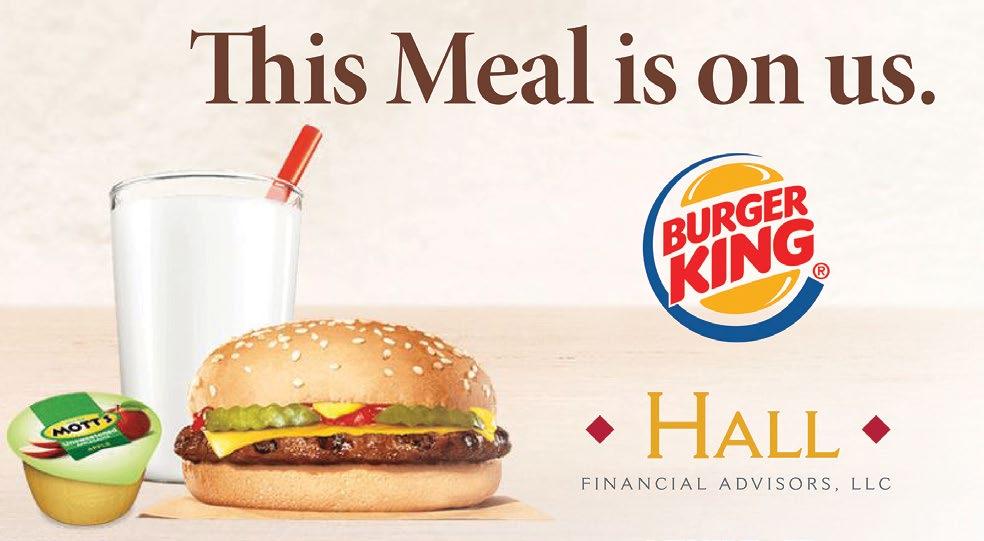


Amidst the chaos of the nation’s shutdown because of the novel coronavirus pandemic in March, restaurant operators were naturally focused on how to adjust their businesses to emphasize drive-thru and delivery service as their dining rooms were shuttered.
Looking beyond their own challenges to see how they could meet the needs of their communities, however, was something that many were also able to do. Among them was Charton Management, which owns nine BURGER KING® restaurants in Ohio and West Virginia, and worked in partnership with Hall Financial Advisors, an associate member of the National Franchisee Association (NFA).
The two companies provided 2,000 free BK® kid’s meal coupon cards to two local school systems to distribute to students who would miss meals by not being in school. The cards were provided to the Wood County, West Virginia, and Washington County, Ohio, school superintendents, who then distributed them to their students.
Franchisee Matt Herridge said Chris Hall, managing principal of Hall Financial Advisors, approached him with the idea. “[He] has a charitable organization that regularly looks for ways to give back to the community,” Herridge said. “Chris suggested the idea, and we developed it
very quickly so that we could get the meals to those in immediate need.”
Because of the quick teamwork of Charton and Hall, the coupons were made available within the first week of the closing and could be used at any of Charton’s nine locations.
“Area schools had just been closed, and parents were scrambling to adapt,” said Herridge. “School systems were trying to plan how to continue to feed students who would not be present, and no program had been put in place yet. A very large number
of children in our communities benefit from the free school lunch program. We know that small businesses are often more efficient than government agencies in solving problems and acting expediently. We saw a need and knew we could fill that need fast.”
The Charton team was thrilled to receive recognition from local TV and print media for its hard work. The team’s efforts were also complemented the following week by Burger King Corp. with its national free kid’s meals promotion through the BK app. n
2020 ISSUE 2 | Flame 7 MEMBER NEWS
Hall Financial Advisors worked with a local marketing agency to design and print 2,000 coupons for free kids’ meals, which were distributed to students in need.
Ocedon Feeds First Responders in Colorado
Ocedon, owned by franchisees Ken and Elena Donahue, operates 35 BURGER KING® restaurants across Colorado. Earlier this year, teams from Ocedon’s restaurants statewide showed support for their communities by providing food to first responders in the wake of the COVID-19 crisis.
A variety of meals, including WHOPPER® sandwiches, chicken nuggets, mozzarella sticks and jalapeño cheddar bites, were delivered to the local heroes on the front lines. The first deliveries were made in the Highlands Ranch area, where Ocedon’s team visited South Metro Fire Station No. 16, the Douglas County Sheriff’s Highlands Ranch substation and UC Health Hospital.
To show its thanks and support to the Aurora Public School District’s efforts to feed the community, the Aurora, Colorado, restaurant team donated 50 meals to the nutrition department staff at Aurora Public School District, which provided free meals to approximately 3,500 families each day during the crisis.
Following suit, the Denver team partnered up with The Redstone Group and Filtercorp, donating 50 meals and 25 gift cards to the Denver Police Department, District 4. The Canon City team also donated meals to the Canon City Police Department and Fire Department to show its appreciation.
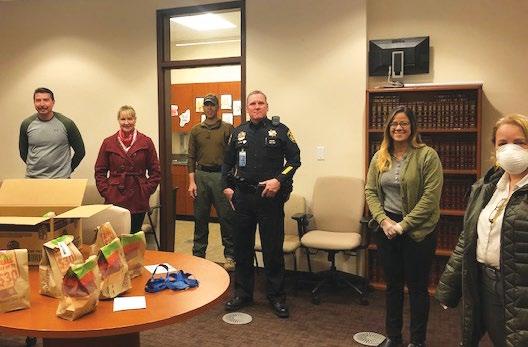
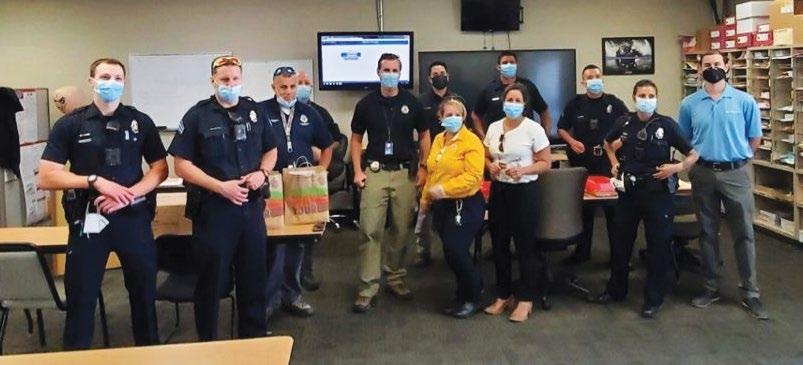
Ocedon President of Operations Maru Schrader and Area Business Managers Lahyded Hernandez and Gustavo Martinez were among the few who travelled around the community to drop off the donations, which came to over 350 meals total. At each location, the front-line teams were very appreciative of the donations. They were happy to have delicious lunches brought directly
to their doors.
Ocedon was thrilled to be able to help those in their towns who are working hard to keep people safe. “It felt great in this time of crisis to help our first responders who are working hard every day to save lives,” said the Donahues. “They were so grateful and excited to eat some WHOPPERs!”
Ampler Burgers Opens New Mesquite Location Amid Pandemic
In mid-May, Ampler Burgers, owned by franchisee
Kevin Fernandez, opened its newest BURGER KING® restaurant in Mesquite, Texas. Despite the setbacks the COVID-19 pandemic caused for restaurant owners in the spring, the team still opened the restaurant to the Mesquite community.
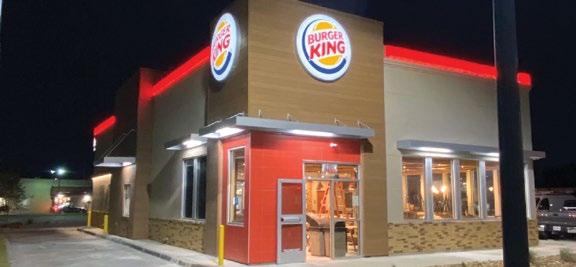

The building was previously occupied by a Carl’s Jr. restaurant, and the Ampler construction team converted it into a brand-new BK® in just 49 days. The company chose this location because the building was in great condition and in a great location in the Dallas-Fort Worth market.

“This location filled a pocket for Ampler in the market and connected our district manager territory in the Southeast,” said Nick Boyle, president of real estate and development. “Traffic counts were strong, and there is a nice retail symmetry around us.”
The pandemic changed the way Ampler typically constructs its restaurants. During this build, the team took many extra precautions from taking temperatures and requiring masks to following strict sanitation protocols on materials arriving to the site.

Ampler President Matt Bars is proud of the team for adapting to the current situation and getting the job done. “Our leadership has done a wonderful job understanding the complications of

COVID-19 and the challenges it presents. The construction crews and operations teams did a spectacular job of working together to avoid any type of exposure,” said Bars.
Team members persevered through all the obstacles they faced and ended up finishing construction about a month early. “This shows that determination, creative thinking and solid planning make anything possible,” said Bars.
Due to social-distancing restrictions, the opening just consisted of the drive-thru. However, guests were still excited to get in line and enjoy a delicious WHOPPER®. Once it’s safe, Ampler looks forward to hosting a celebration of the opening to welcome Mesquite residents into the dining room. n
8 Flame | 2020 ISSUE 2 MEMBER NEWS
n
Maru Schrader and Lahyded Hernandez delivered WHOPPERs to first responders on behalf of Ocedon.
The new Mesquite, Texas, restaurant was once a Carl’s Jr. building.
The Breakfast Club Continues Traditions at Kennesaw, Georgia, BURGER KING Despite COVID-19
For many years, a group of retired U.S. Navy veterans has gathered at GPS Hospitality’s BURGER KING® restaurant in Kennesaw, Georgia. The group, nicknamed “The Breakfast Club,” is made up of about 10 veterans and their spouses. Each day, several of the members go to the restaurant to enjoy their favorite BK® items, including French toast sticks, sausage biscuits, croissants and senior coffee.
Although the COVID-19 pandemic led to temporary shutdowns of dining rooms across the country, The Breakfast Club members didn’t let the virus stop them from enjoying each other’s company. They brought their own chairs and held meetings in the parking lot of the restaurant, allowing them to appropriately social distance from each other.

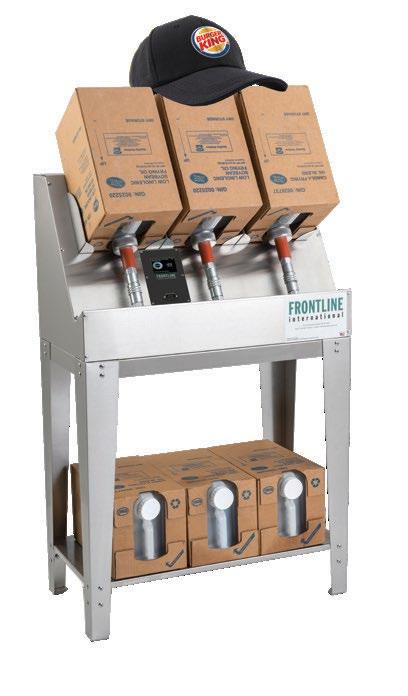

Restaurant General Manager Donna went out of her way to make sure the guests’ cups were full. She has been making guests feel welcome at BURGER KING for 37 years, serving as an example of GPS Hospitality’s service-obsessed values that are encouraged among its employees.
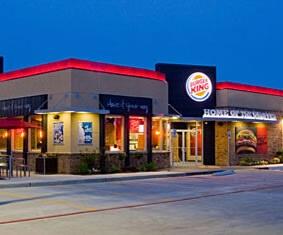
GPS is honored that its restaurant is the primary meeting place for The Breakfast Club. “We love being an active part of

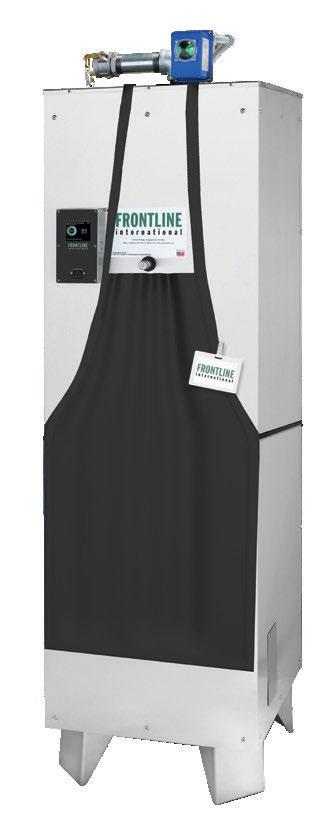


the communities we serve, and we are delighted to see their commitment to each other,” said GPS Hospitality Director of Communications Lisa Grier. “We love the spirit of The Breakfast Club and enjoy serving them at our Kennesaw restaurant.”

Although there have been many surprises over the past few months, GPS Hospitality is happy to see that the guests have continued their traditions and visit with each other at a safe distance. n

2020 ISSUE 2 | Flame 9 MEMBER NEWS Frontline Smart Oil Management® Systems lower labor costs and the cost of cooking oil. No contracts or endless leases. Skip the interview and move straight to the hiring stage. © Frontline International 2020 www.frontlineii.com 877-776-1100 In the era of a $15 minimum wage, Frontline is the answer. HIRED! F O R A C O N F I D E N T I A L V A L U A T I O N C A L L T O D A Y 9 4 9 . 4 2 8 . 0 4 9 2 E X P E R I E N C E D | D E M O N S T R A T E D T R A C K R E C O R D W W W . N A T I O N A L F R A N C H I S E S A L E S . C O M M I K E D E E G A N m d @ n a t i o n a l f r a n c h i s e s a l e s c o m E X P E R I E N C E M A T T E R S I N A C Q U I S I T I O N M O D E ? V i s i t t h e N F S w e b s i t e t o l e a r n a b o u t B u r g e r K i n g a n d o t h e r f r a n c h i s e o p p o r t u n i t i e s ! S O L D !
The Breakfast Club, a group of U.S. Navy veterans and their spouses, has been gathering for breakfast at the Kennesaw, Georgia, BURGER KING for many years.
GPS Hospitality Sought 1,500 New Employees
GPS Hospitality, owned by multiunit franchisee Tom Garrett, worked through the spring to actively recruit new full- and part-time team members. The company had a goal of securing 1,500 new hires throughout its locations in 13 states.
“Although the economy is not quite in recovery mode, we can see the importance of having our teams fully staffed, trained and
Regional Events
Oct. 21
Southwest Franchisee Association Regional Meeting

Phoenix, Arizona
Jan. 10-12, 2021
Mid South Franchisee Association Regional Meeting
New Orleans, Louisiana
National Events
Oct. 14-15
NFA Board of Directors Meeting
Atlanta, Georgia
Dec. 1-2
Elevanta Board Meeting
Atlanta, Georgia
Dec. 7-9
NFA Board of Directors Meeting
Atlanta, Georgia
March 9-12, 2021
NFA LEAD Conference
Las Vegas, Nevada
ready to serve our guests as the public becomes more and more confident in returning to our dining rooms,” said GPS Hospitality President Michael Lippert. “Our management teams will be searching for motivated candidates who share our guest-forward values to help meet those increased needs.”
To get to know candidates efficiently and safely, the company’s hiring managers incorporated video interviews with applicants for full- and part-time positions, including managers and team members, in the hopes they could join the team immediately. To make the application process simple, GPS set up a text service where potential applicants could text “GPS” to 37872 to apply for a position or visit the www.WorkForGPS.com website for an online application.
“We’ve been working with our managers to expedite the hiring process with contactless methods to ensure the health and safety of everyone involved,” said GPS Vice President of Human Resources Vickie Volan. “Once hired, new employees will receive comprehensive training, including cleaning and sanitation procedures.” n
Tasty Restaurant Group Hires New CFO
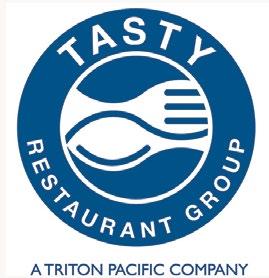

In June, Tasty Restaurant Group, owned by franchisee Robert Rodriguez, selected Neil Thomson as chief financial officer for its 190 BURGER KING® and Pizza Hut units.

As a senior finance executive, Thomson holds extensive experience in the quick-service restaurant industry with a track record of building teams, improving systems and processes, and delivering results within rapidly growing businesses.

He previously served as the chief financial officer of Del Frisco’s restaurant group and helped guide the company through a going-private deal in 2019. Prior to his tenure at Del Frisco’s, Thomson worked for 15 years in various senior roles at Yum Brands International and its affiliated Pizza Hut and KFC concepts.
“We are thrilled to welcome Neil to Tasty Restaurant Group’s executive management team,” said Rodriguez. “We are fortunate to have attracted such a well-respected industry veteran to join us, and his nearly 30 years of experience and success will prove invaluable.”
10 Flame | 2020 ISSUE 2
n MEMBER NEWS
calendar
Neil Thomson was appointed chief financial officer for Tasty Restaurant Group.


2020 ISSUE 2 | Flame 11 Our dedicated franchise team eats, sleeps, and breathes franchised restaurant lending. We’re here for you, today and tomorrow. How may we serve you? New Stores . Remodels Acquisitions . Refinancing Real Estate . Equipment ppbifranchise.com 402.562.1800 Pacific Premier Bank is a registered trademark. All rights reserved. LIKE YOUR FAVORITE CONDIMENT, WE MAKE LOANS BETTER INGREDIENTS: KNOW-HOW, BUSINESS SAVVY, STRENGTH, RELIABILITY, QSR EXPERIENCE, FLEXIBLE LENDING fancy Ketchup
Support the Vendors
That Support Your Association


12 Flame | 2020 ISSUE 2
Company Name Level Contact Name Email Phone Elevanta Health Partner Zack Johnson zackj@nfabk.org 678-540-6214 Elevanta Payroll & Accounting Partner Stephanie Luke sluke@mizehouser.com 785-233-0536 x3022 Lockton Affinity Partner Reid Robson elevanta@locktonaffinity.com 844-403-4947 Keurig Dr Pepper Diamond Josh Hanley josh.hanley@dpsg.com 770-844-1597 The Coca-Cola Co. Ruby Clint McKinney clmckinney@coca-cola.com 678-237-3063 Welbilt Ruby Joan Salah joan.salah@welbilt.com 813-504-9262 Green Dot/rapid! Sapphire Edward Cole ecole@greendotcorp.com 813-340-3276 The Hershey Co. Sapphire Kevin Austene kaustene@hersheys.com 636-265-0811 Xenial Sapphire Samantha Young samantha.young@xenial.com 215-485-0292 Casablanca Design Group Pearl John Harrison john.harrison@casablancadesign.com 770-337-0931 DTiQ Pearl Mira Diza mdiza@dtiq.com 857-277-5145 Ecolab Inc. Pearl Al Powell al.powell@ecolab.com 816-206-2513 Frontline International Inc. Pearl Giovanni Brienza gbrienza@frontlineii.com 330-861-1100 Global Building Contractors LLC Pearl Reece Milton r.milton@gbc.llc 865-640-7099 Gycor International Pearl David Rogers drogers@gycorfilters.com 800-772-0660 J.R. Simplot Pearl Brad Glover brad.glover@simplot.com 704-391-8321 Mount Franklin Foods Pearl Linda Dorsett lindad@azarnut.com 904-923-4053 Nestlé Waters North America Pearl Anthony Ventricelli anthony.ventricelli@waters.nestle.com 203-249-5397 SKECHERS Pearl Harold Surabian haroldsu@skechers.com 310-318-3100 x1860 The Middleby Corp. Pearl Brad Davis bdavis@middleby.com 786-503-4580 TraitSet Pearl Lenny Crouse lenny@hrgems.com 563-580-2649 Tyson Foods Inc. Pearl Kathy Black kathy.black@tyson.com 410-340-3974 Alliance Payroll Services Assoc. Mbr. Chris Murphy cmurphy@alliancepayroll.com 507-244-1998 Altrua Global Solutions Assoc. Mbr. Sandi Halo shalo@altrua.com 800-443-6939 Atmosphere TV Assoc. Mbr. Joey Martinez joey.martinez@atmosphere.tv 512-947-5789 CC Image Group Assoc. Mbr. Rob Cooley robcooley@ccimagegroup.com 404-433-4924 DAR PRO Solutions Assoc. Mbr. Bill Borrelli bborrelli@darlingii.com 248-705-0047 DMI Manufacturing Inc. Assoc. Mbr. Denise Bangasser denise@dmiparts.com 800-238-5384 Duke Manufacturing Assoc. Mbr. Rick Garriga rgarriga@dukemfg.com 305-606-2084 Emser Tile Assoc. Mbr. Jessica Sheldon jessicasheldon@emser.com 201-341-5468 Filtercorp Assoc. Mbr. Brian Bonham bbonham@filtercorp.com 720-329-3816 Franke Foodservice Supply Assoc. Mbr. Stephen Walls stephen.walls@franke.com 615-462-4191 Frozen Beverage Dispensers (FBD) Assoc. Mbr. Joe Clements jclements@fbdfrozen.com 214-732-9555 Ganaway Contracting Co. Assoc. Mbr. Susan Monson susan_monson@ganaway.com 770-650-7722 x106 GoPlay USA Assoc. Mbr. Graeme McKenzie graeme@goplayusa.net 858-220-9557 Hall Financial Advisors LLC Assoc. Mbr. Angela Harkness angela.harkness@wfafinet.com 866-865-4442 Honor Built Assoc. Mbr. Stewart Austin stewart.austin@honorbuilt.com 404-952-2600 Hoshizaki America Inc. Assoc. Mbr. Travis Rieken trieken@hoshizaki.com 813-995-3994 InSite Real Estate Assoc. Mbr. Tom Kostelny tkostelny@insiterealestate.com 630-617-9155 Jolt Assoc. Mbr. Briton Page briton.page@jolt.com 877-396-4112 Lancer Corp. Assoc. Mbr. Greg Edwards greg.edwards@lancercorp.com 904-631-1031 Loomis Assoc. Mbr. Tom Simon tom.simon@us.loomis.com 602-619-9886 Marmon Foodservice Assoc. Mbr. Guido Nava guido.nava@cornelius.com 630-539-6850 National Franchise Sales Assoc. Mbr. Mike Deegan md@nationalfranchisesales.com 949-428-0492 Netspend Corp. Assoc. Mbr. Michael McEnerney mmcenerney@netspend.com 470-208-0937 One More Time Assoc. Mbr. Alex Alvarez aalvarez@onemoretimeinc.com 323-839-8541 Ooma Inc. Assoc. Mbr. Alicia Azeltine alicia.azeltine@ooma.com 646-844-1146 OwlOps Assoc. Mbr. Doug Rixmann doug.rixmann@owlops.com 800-677-4860 Pacific Premier Franchise Capital Assoc. Mbr. Sharon Soltero ssoltero@ppbifranchise.com 402-562-1801 Paycor Assoc. Mbr. Jarod Alexander jalexander@paycor.com 412-715-2496 Restaurant Technologies Inc. Assoc. Mbr. Aimee Krueger akrueger@rti-inc.com 850-525-9366 Revenue Management Solutions (RMS) Assoc. Mbr. Chris Norton cnorton@revenuemanage.com 813-386-5005 Samsung Electronics America Inc. Assoc. Mbr. Samantha Verrier sverrier@sea.samsung.com 201-446-0369 Shoes for Crews Assoc. Mbr. Kim Redmin kimr@shoesforcrews.com 561-683-5090 SYR Assoc. Mbr. Todd Lancaster todd.lancaster@syrclean.com 412-779-1381 The ICEE Co. Assoc. Mbr. Kayla Wells kwells@icee.com 615-558-9462 UPshow Assoc. Mbr. Jon Tenpenny jtenpenny@upshow.tv 248-231-5714 Valley Proteins Inc. Assoc. Mbr. Ron Rogers rrogers@valleyproteins.com 540-877-3220 Veterans of Foreign Wars Foundation Assoc. Mbr. Richard Potter rpotter@vfw.org 816-968-1158 Wholesale Ceiling Solutions Assoc. Mbr. Stuart Holaway stu@wholesaleceilingsolutions.com 844-825-1500 Wintrust Franchise Finance Assoc. Mbr. Ed Semik esemik@wintrust.com 847-586-2643
One topic: 10 facts Social Media and the Restaurant Industry
1
There are 3.03 billion active social media users, while approximately 91% of retail brands use two or more social media channels.
2
Of the more than 1 million mentions on social media sites about the restaurant, food and beverage industry, 57% of these were about quick-service restaurants.

3
Seventy-one percent of customers say they’re more likely to recommend a company that responds quickly to them on social media.
4
When choosing a restaurant, Gen Z and Millennials are 99% more likely to rely on social media and online reviews than are Gen X and Boomers.
5
Nearly 72% have used Facebook to make restaurant or retail decisions based on comments and images that have been shared by other users.
6
Out of all brand mentions on Twitter, food and drink brands are mentioned the most, accounting for 32% of tweets.
7
The best times for a restaurant to post on Instagram are when people are eating and looking at pictures on their phones: 9 a.m., between 12 and 1 p.m., and 8 p.m.
8
More than 33% of diners will not choose to eat in a restaurant with less than a 4-star rating on online review sites like Yelp, Google and TripAdvisor.
9
One in eight diners will post a restaurant review after their meal.
10
Seventy-five percent of consumers will not visit or patronize a restaurant with negative reviews about its cleanliness.
Source: Review Trackers
2020 ISSUE 2 | Flame 13
Spotlight on the 116th Congress: Rep. Chip Roy (R-TX-21)

QDuring your time working with the Texas attorney general, what qualities or skills did you develop that you utilize as a representative?
AFirst, I was responsible for managing for the attorney general an organization of over 4,000 employees, with 700 lawyers managing 28,000 lawsuits, which gave me a firm understanding of the responsibility of the executive branch to carry out the laws and administration of government. But, most of all, it gave me a firm appreciation for the importance of defending the U.S. Constitution and the rule of law for the ability of free enterprise to flourish.
QHow is relief legislation, similar to what was passed during the pandemic, important to small-business owners?
AThe state and local response to COVID-19, right or wrong, crippled small businesses. Because it was the government response that prevented business owners from keeping their doors open, it was incumbent upon government to compensate for the loss. Relief legislation like the Paycheck Protection Program (PPP) and my PPP Flexibility Act provided the necessary cash flow to bridge this gap so small-business owners could pay their bills and keep their employees.
QHow has your role on the House Committee on Oversight and Reform influenced your opinions on the impact of legislation on small business?
AI’ve learned throughout my experience on the Oversight Committee that the committee can be a good venue for reviewing legislation and the implementation of such policies, but I wish the committee would exercise that role more often. For
example, there is plenty of oversight we could be doing over the trillions of dollars spent during the coronavirus response, including funds to small businesses to ensure funding was properly spent and that small businesses that need funding receive it accordingly.
QWhat challenges have you helped small businesses in your district overcome?
AI listened to small-business owners in my district and incorporated their feedback in drafting the PPP Flexibility Act, a bipartisan piece of legislation I introduced with my friend Dean Phillips of Minnesota. This bill, which passed the House and Senate almost unanimously and was recently signed into law by President Trump, provides small-business owners needed flexibility in the use of PPP funds. It helps them adapt to government-imposed lockdowns that have lasted longer than originally anticipated and gives small-business owners a greater chance of having their PPP loans forgiven.
QIn what ways are you seeking feedback from small businesses in Texas and using that information in Washington, D.C.?

ADuring the pandemic, I have met one-on-one with dozens, if not hundreds, of small-business owners in my district to understand what they need to survive. I worked with local trade organizations like the Texas Restaurant Association, the Texas Hotel and Lodging Association, and other local and national trade groups to ensure the legislation I draft and support in Congress addresses their needs during this unprecedented time. I will continue to seek their feedback as we reopen the economy so that we in D.C. understand the continuing challenges they face and adapt our policy solutions to meet those challenges. n

14 Flame | 2020 ISSUE 2
LOOK LISTEN READ
Look, Listen, Read is a quarterly compilation of some of the most highly rated and reviewed apps, podcasts, books, websites and other resources. NFA does not support or endorse the use of these tools, which merely serve as a guide to exploring a new level of knowledge and productivity for your business.


5All it takes to make creativity a part of your life is the willingness to make it a habit. It is the product of preparation and effort and is within reach of everyone. Whether you are a painter, musician, businessperson or simply an individual yearning to put your creativity to use, “The Creative Habit” provides you with 32 practical exercises based on the lessons Twyla Tharp has learned in her remarkable 35-year career.
1
The Entrepreneurship Elevated Podcast, led by author of “Profit First” Mike Michalowicz, is a show for entrepreneurs who want to increase their profits. Since when did talking about money need to be boring?! The Profit First Podcast gets serious about money by having the most fun possible.
2 Your notes. Organized. Effortless. Take notes anywhere and find information faster with Evernote. Share ideas with anyone as well as meeting notes, web pages, projects, to-do lists. With Evernote as your note-taking app, nothing falls through the cracks.
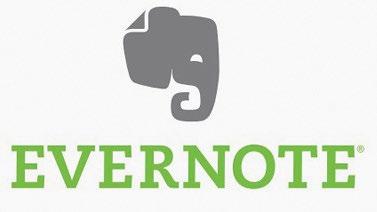



6We’ve all known the “naturals” – people who can get up to speak in any business situation and make something happen. They get the budget approved, win the big account, get the group’s support at the weekly staff meeting. When the “naturals” finish speaking people believe – and act. Now fully revised and updated, ”Speak and Get Results” helps you to be a natural and helps you to get the results you want.
3
If you are a service-based business, FreshBooks is designed for you. If you create value for your customers by applying your time and expertise to other people’s problems, FreshBooks is built specifically for you. FreshBooks uses a web-based software as a service model, whereby instead of installing and maintaining software locally, the software is accessed through a desktop or mobile device.
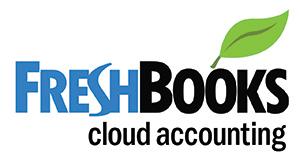
4
High-quality writing is more than just mechanics. Grammarly Business goes deeper with real-time suggestions for improving readability, word choice, writing style and tone. More than 20 million people around the world use this AI-powered product every day to strengthen their writing and say what they really mean. Grammarly Business’s writing assistant supports clean, mistake-free writing while offering suggestions that go way beyond grammar.

7“Built to Last,” the defining management study of the ’90s, showed how great companies triumph over time and how long-term sustained performance can be engineered into the DNA of an enterprise from the very beginning. But what about the company that is not born with great DNA? Using tough benchmarks, Jim Collins and his research team identified a set of elite companies that made the leap to great results and sustained those results for at least 15 years. In ”Good to Great: Why Some Companies Take the Leap and Others Don’t,” Collins outlines his findings from the good to great research.
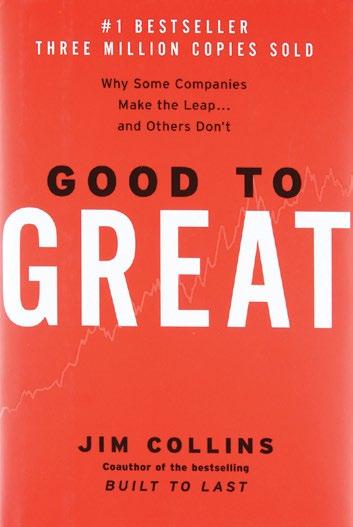

8The SmallBizChat Podcast is dedicated to helping you live your best life as a small-business owner. The mission is to end small-business failure. n






2020 ISSUE 2 | Flame 15
‘A Penny Business:’ Franchisees Battle Rising Food Costs

When costs go up, profits go down. It’s a simple, unbendable rule of business that harkens back to basic school lessons on capitalism and the law of supply and demand. When food costs go up, restaurant franchisees notice immediately because of the impact on the bottom line.
No matter the reason – whether ongoing trade battles with China, the 2018 outbreak of African swine fever in overseas pork stocks or COVID-19-related shutdowns of meat-processing plants – food prices have been going up steadily since the fourth quarter of 2018, an unpleasant development that has BURGER KING® franchisees looking more closely than ever at ways to track inventory, reduce kitchen waste and keep tighter control of the money that flows into and out of their restaurants.

Restaurant Services Inc., the supply chain manager for the BK® system and the exclusive purchasing agent for the vast majority of the products and distribution services used by BK franchisees in the United States, has noted a decline in ideal gross profit measurements among BURGER KING restaurants, with rising food and packaging costs responsible for most of the downward pressure. “We measure, track and monitor food and packaging costs through the Food and Packaging Cost Index (FPCI), which is conveniently displayed on RSI Web for our members,” said Joel Neikirk, president and CEO of RSI and a former BK franchisee. “In the last 12 months, the index showed a significant increase in food costs compared to 2018, predominately driven by beef.”
As a result, companies are looking at food costs even more closely over the last year than they had traditionally. “Food cost has taken center stage on our profit and loss statements. It has always been our second-highest controllable, but today, we are tracking this metric more closely than we ever have because the room for error is so small,” said Jordan Drury, franchisee with Drury Restaurants, which owns 36 BK locations in Arkansas, Illinois, Kentucky and Missouri.
Pork and beef have been two of the biggest culprits, and a combination of factors have affected prices. Higher demand for animal protein in China is causing higher beef prices, and disease issues hurt pork supplies in China and some surrounding countries. In the United States in April, a few meat-processing plants were closed when there were severe outbreaks of COVID-19 among employees.
“Our trends have
not been any different than anyone else in the country. As commodity costs go up, food cost rises with them,” said Bill Keller, a franchisee with BMT of Kentucky, which owns 15 restaurants in the Bluegrass state. “RSI does a great job publishing NewsBriefs on what is happening and with what items. Long-timers in the system know that beef and produce pricing move weekly, so you learn to check your plate costs on a regular basis.”
by SEAN IRELAND
“We are expecting a lot of ups and downs in our cost during the next few months with changes happening in the trade agreement, with weather and BKC’s pursuit of clean products,” Keller added. “You have to stay aware of what might happen. I personally feel the days of achieving a net gross profit percentage (GP%) of 70 are gone, so you manage the pennies daily or else.”
In RSI, BK franchisees have an able ally to help them manage their food costs. “To benchmark the performance of purchasing negotiation and commodities management, we closely monitor and compare the RSI FPCI to the Producer Price Index for the same basket of commodities in the general economy,” Neikirk said. “RSI’s management goal is to ensure our product prices increase less than the general market.”
RSI tools, available through its website and mobile app, provide access to critical restaurant data that helps managers monitor food costs and act in areas of opportunity. (See sidebar, page 18.) “We are constantly incorporating data from RSI,” said Bruce Daniels, franchisee with Carolina Franchise Holdings, a company with 30 BK restaurants in Georgia, Florida and the Carolinas. “The data generated via in-store measurements allows us to better monitor waste management, truck ordering and product mix. Much of our operational strategy is predicated on measuring this historical data and course correcting as we go.
“As a franchisee that acquired a former group, we were able to implement tools and routines that were not utilized in previous years. Our gross profit has risen exponentially since our origination date, as we have managed to curtail unnecessary food costs and maximize control with all teams,” Daniels added in comments made before the COVID-19 outbreak interrupted most normal restaurant operations in mid-March. “Food costs are rising slowly, but we’ve taken the necessary steps to control what is within
16 Flame | 2020 ISSUE 2
our influence, which is operations.”
The tools provide several ways for restaurant managers and employees to take the sting out of increased costs. Of all the things to be done at the individual restaurant level, taking frequent and accurate accounting of food product is the most important. The diagnosis of problems and the adjustments needed to fix them cannot be made if food product is not tracked. “Accurate inventory management allows operators to gain visibility into their waste, a large component of food cost,” Neikirk said. “Loss equates to higher food costs and taking inventory is an area of opportunity where operators can control their costs by closely monitoring both their known and unknown waste at the restaurant.”
RSI strongly encourages restaurant operators to set what Neikirk calls a “consistent inventory-taking cadence across all restaurants – monthly, weekly and daily” – that allows for the effective benchmarking of performance and measurable results in food costs.

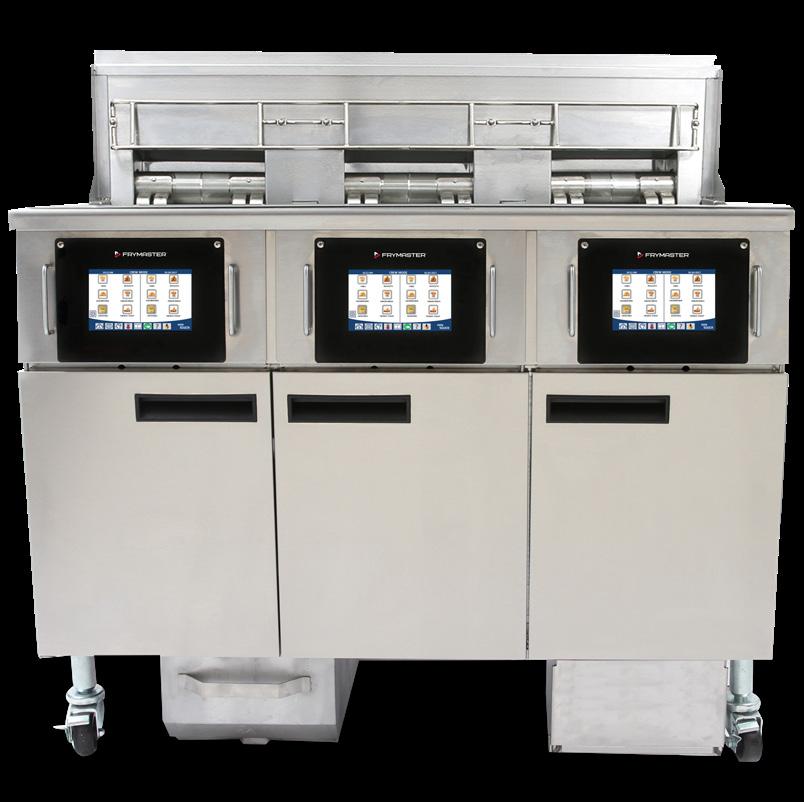
RSI suggests a schedule to include:
• A monthly inventory that should consist of all items in the restaurant.
• A weekly inventory that should consist of food items only.
• A daily inventory that should consist of high volume/high cost foods only.



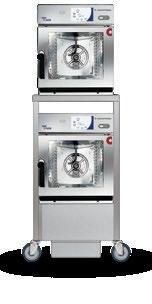

RSI Inventory and RSI Analytics mobile apps can help manage inventory and highlight critical product line variance (PLV, the difference between the ideal cost of a product and the actual cost of that product), performance data, improve day-to-day efficiency and drive overall profitability.
“We use the RSI app and check our gross profit percentage daily along with product line variance and waste,” Keller said. “We
have a target percent for waste of 1% and variance of .5% or 1.5% total. This is checked daily and reacted to by the supervisors.”
At BMT of Kentucky, items are inventoried on midday breaks and balanced with the POS. The company also keeps a monthly GPM workbook that has every item, the plate cost GP% and combo meal in it to anticipate what happens to its margins with an increase in tomato costs or a decrease in the cost of WHOPPER® patties. “The bottom line is that you must check your inventory daily and react to your variances each day,” Keller said. “If you do this daily, you will know what your month will be because you know your problem and/or where the problem is.”
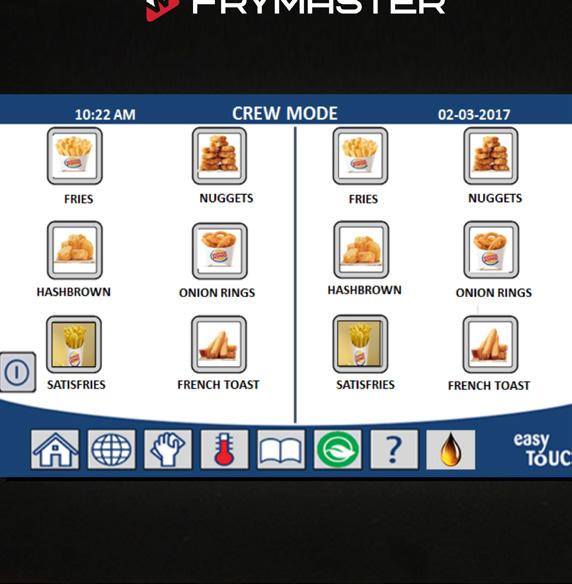
He also recommended daily checks on the top cost items via inventory reconciliation with complete monthly or period inventories so that beginning and ending inventories are always known. “You can always go backward to find a problem, but without any actual inventories, you will never find the problem or when it started,” Keller noted. “Be willing to take deep dives into all the tools that are around today. For example, we had one unit all last year that trailed our group gross profit percentage number by over 3%. We balanced all the inventory, counted coupons, changed managers and cussed a few times, but never found the issue until recently. We found using the RSI Analytics Promotions dashboard on the iPad that we could view each unit’s promos and saw many substitutions of main menu items under the two-for-$6 promotion and the two-for-$10. That POS function was turned off and margins moved up 2.5%. So, when you know that there is a problem, keep looking because there is an answer.”
Rackson Restaurants, with 51 locations in New Jersey, New
Continued on page 18

2020 ISSUE 2 | Flame 17 Order your Frymaster ® FQ4000 Controller Today! EasyTouch® Touchscreen NEW SMART4U® FQ4000 Controller welbilt.com Joan Salah | joan.salah@welbilt.com | 813.504.9262 SUPPLIER FOR OVER 40 YEARS WBT_BK_NFA_HalfPage_Multibrand.indd 1 2/14/20 4:37 PM
Penny Business
Continued from page 17
York, Connecticut, Pennsylvania, Delaware and Maryland, does complete breakfast, midday and closing counts as well as weekly and monthly inventories. “If we see a higher discrepancy with certain inventory, we then count those items more frequently throughout the day,” said New York-based Area Coach Digna Ayala. “We also set a target of running a .2% variance from ideal versus actual.”
“All stores have implemented daily and weekly counts to improve our inventory control, and our leadership team discusses variances with managers regularly,” Daniels said about Carolina Franchise Holdings. “BKC has provided a kitchen-management system called ‘Chef’ that gives real-time assistance in understanding historical sales along with current food on hand that allows our kitchen staff to hold and prep food while minimizing waste. Chef is a huge routine for us, and we actually started incentivizing our teams through their performance on grading here.”
Food waste also bears close tracking, according to Neikirk and the franchisees. “RSI has two powerful PLV tools as part of its analytics suite that members can leverage to surface potential waste and loss issues,” he noted. RSI’s PLV 91-Day Estimate takes the difference between purchases and sales to estimate a restaurant’s PLV over the previous 91 days, and PLV with Inventory takes the
RSI Tools Help Franchisees Manage Costs
RSI offers its members a host of tools available on RSI Web, www.rsiweb.com, and RSI Analytics, its mobile application, providing access to critical restaurant data and helping them to monitor food costs, take action in areas of opportunity and, ultimately, improve waste and profitability performance. Some of these tools include:
• Food Cost Outlook to better understand food cost trends and RSI’s most up-to-date food cost outlooks.
• Gross Profit Drivers to identify:
• Mix shifts adversely affecting gross profits.
• Ingredient items having the largest impact on food costs and GPs.
• Indirect cost increases, including oil and ketchup packet consumption.
• PLV benchmarking to identify restaurant waste opportunities.
• Coke Freestyle Credit Portal to request cartridge credits from Coca-Cola.

• Voids, Discounts & Deletes to monitor discrepancies in voids, discounts and delete sales patterns, which may include potential theft.
• DC Usage Ratios to benchmark oil consumption and other food cost ratios.
Download RSI Analytics from Apple or Google Play app stores.
difference between the purchases, sales and inventory to estimate a restaurant’s PLV. “Both have proven to be instrumental in helping members identify potential waste and loss opportunities that directly impact profitability in their restaurants,” he said.
The tools are only one part of the equation, however. Restaurant management and employees must be committed to reducing waste. “Food cost is getting tougher and tougher to manage, so if you’re not on top of it every shift, it will creep up on you,” Drury said. “It takes laser focus from crew and management alike. Getting the crew trained on how to look and think about food cost and ultimately take ownership over their workstations is crucial in today’s operating environment.”
Drury Restaurants uses five buckets – ones for raw waste, fry station, specialty, main boards and prep areas – in every kitchen to track waste. It’s recorded after every daypart, and from that, the company can get a rough estimate of the dollar amount of the items that are discarded. Improvement starts by reducing the amount that ends up in each bucket.
“We count certain high food cost items each night and enter that information into RTI to help produce a daily food cost variance,” Drury said. “We also do a full detailed inventory every month in every restaurant, but if I’m honest, it needs to be every two weeks. We’re working on getting there, but with all the other things our managers deal with, it’s been difficult for us to implement.”
There are other ways to find savings. “We have picked up our pace on watching and monitoring the units for theft, underringing, mobile app abuse and digital coupon abuse. Fortunately, we have video surveillance in all locations along with voice, so it helps us in verifying what happens,” Keller said.
“We have also begun taking coupons and discount programs out of our registers immediately upon expiration or program end dates,” Drury said. “This prevents our order-takers from succumbing to guest pressure to honor a deal that has expired. We always want to take care of our guests, but we always communicate that if one deal has ended, another one is always right around the corner.”
Drury Restaurants has also instituted a program to train its managers to submit all items it receives broken or out of shelf life back to the distributor for credit. Only when all its managers were consistently doing so did the company realize what it had been losing. “We quickly realized as we implemented a standard practice for our managers to submit items for credit from our distributor, the dollars began rolling in. I mean, we paid for these things, why would we not want to get credit for a case of rotten tomatoes or busted barbecue sauce?” Drury asked. “I can’t stress enough how huge this became for us. We had our teams send pictures to one person in our corporate office and that individual did the necessary paperwork and then submitted it to our distributors for credit dollars on the product. This practice completely takes the stress off the restaurants and has been transformative in making sure everything that arrives in the store is useable and sellable.”
Reducing waste and keeping costs as low as possible is one way to reduce the effect of rising food prices. Increasing revenue by raising menu prices is the other side of the coin. Any changes, however, must be carefully considered.
“If we increase our menu prices, it could offset the higher price of beef and balance our food costs,” said New York-based Operations Manager Omar Guthrie of Rackson Restaurants. “However, if we do so without conducting the proper amount of research, this could result in either reducing customer traffic growth
18 Flame | 2020 ISSUE 2
or encouraging customers to purchase from the value menu rather than purchasing premium menu items.”

“This is the challenge – prices go up daily and weekly, but you cannot change them that often,” Keller said. “Our industry is not like the corner gas station that changes on Thursday to a higher price, then reduces them on Monday. When costs are constant and at your budget, [you do] maybe two changes a year, but today you must be more vigilant.”
Keller said the Revenue Management System that BKC is funding can help in the process, but it requires operators to know where their competitors are with pricing. “You must decide if you are going to lead, follow or just settle in the middle of your competitor prices,” he said.

“You also know that some of the prices you would like to change are part of the ‘two-for-$X’ menu, so you really have to figure out where the opportunities are. If you do not, you may end up chasing your customers to the value menu that you didn’t want them to know about. We found that if we keep certain items on the combo at lower than normal pricing then we can offer value this way. Fish and the Original Chicken are great items that can help present value and really do not need to be priced over a WHOPPER or Crispy Chicken.”
Drury said mitigating food costs by boosting menu prices is part of the revenue side of the solution, but that suggestive selling and superior guest service have a larger impact. “Every order-taker in our restaurants has to understand how suggestive selling and upsizing can really impact store sales,” he said. “When you find one that’s good at it and does it every order, they are worth their weight in gold.” Carolina Franchise Holdings also focuses on upselling. “We drive repeat success with the obsession of driving high margin products and the food quality that goes behind them,” Daniels said.
Drury noted one other way that his restaurants keep as tight a lid as possible on rising food costs: good management. “A good porter that takes ownership over a store and their inventory and keeps that store organized will change your world. I don’t have to tell you how rare they are to find, but when you do, hang onto them like grim death,” he said. “In my opinion, a quality porter is capable of more positive influence on a restaurant than almost any other position. They can make everyone’s job easier from the regional general manager all the way down to the prep person. If they’re good enough and they’re devoted to your store, you, as an owner, will know the name of that individual, I promise.”
Good training is a part of good management. “Our staff controls so much of where our true food cost lies,” Daniels said. “If we over-prep, we’re wasting product. If we over-portion, we’re giving away product. If we make product inaccurately, we’re remaking product and wasting the initial batch. Our training team is a huge reason why we’ve managed to control food cost over the last year.”
Managing costs while still providing the best experience to guests can be a delicate balancing act, but it’s a tightrope that each restaurant operator must walk. Keller captures the high-wire act well: “A penny saved is a penny earned. We are in a penny business, and our teams must know that scraping the mayo out of the tub saves costs and you are not just picking on them,” he said. At the same time, he noted, “It is OK to use salt on the French fries and seasoning on the WHOPPER patties. Not doing this runs the guest away, so it does not save any money. Pennies, pennies, pennies.” n
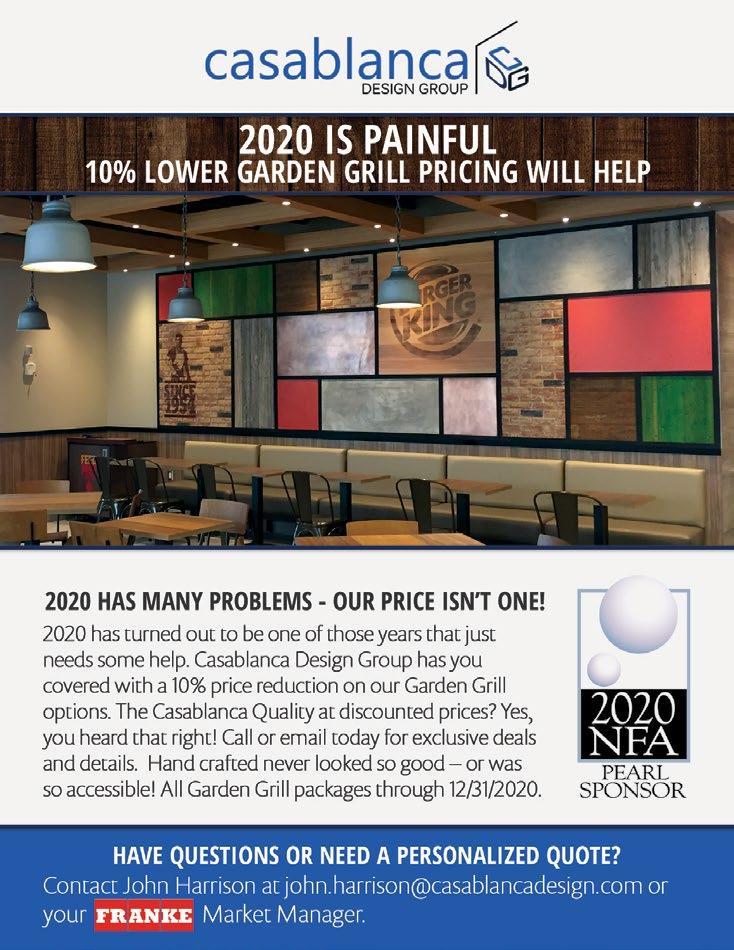
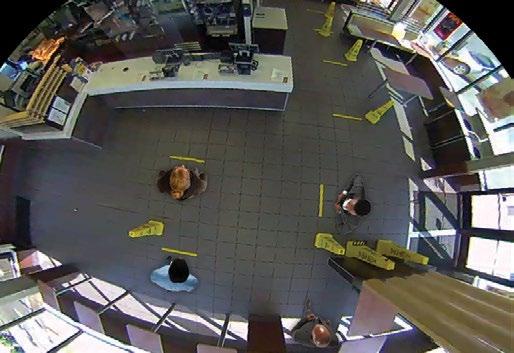
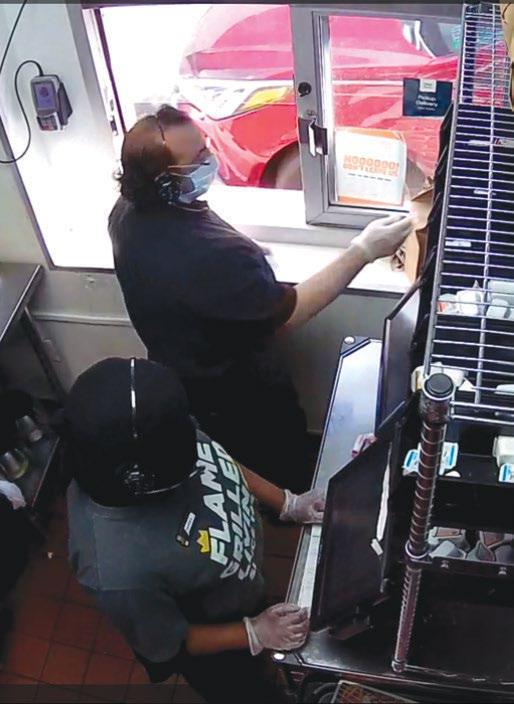
2020 ISSUE 2 | Flame 19 COMMITTED TO SAFETY Peace of mind for your customers -detailed insights & best practices for you www.dtiq.com/products/smartaudits-how-it-works/ info@dtiq.com | 800.933.8388 77% 65% 89% DTiQ SmartAudit™ services
SEAN IRELAND is the NFA associate director of communications. You may reach Ireland at seani@nfabk.org or 678-797-5165.
HEALTH COMPANIES CLOSELY MANAGE P&L STATEMENTS

When someone has questions about their health, they go to their doctor for a checkup. After measuring the patient’s weight, blood pressure, pulse, temperature and body fat, as well as asking questions about lifestyle and family medical history, the doctor has a clear picture about the patient’s overall health and can make recommendations about needed changes in specific areas that will improve their condition.
For businesses, profit and loss statements are much like the doctor’s tools for diagnosing and reporting on a company’s health. They provide an overall picture of the company’s condition and offer insights into areas where specific changes can bring needed improvement. Unlike annual checkups, however, profit and loss (P&L) statements for BURGER KING® franchisees are much too important to be studied only once a year. Rather than being a confidential communication between doctor and patient, P&Ls are shared and used throughout the organization to guide the changes needed to boost fiscal health.
It’s common practice for businesses to generate P&L statements by month or four-week fiscal period as well as quarterly and yearly and to compare them with the same periods for previous years. It’s also common for companies to collect and review certain types of information often found on P&L statements on a weekly – or even daily – basis, such as food and labor costs and sales projections.
P&L reviews at BK®-franchisee companies like Carolina Franchise Holdings, which owns 30 restaurants in Georgia, Florida, and North and South Carolina; JPL Management, which owns 16 restaurants in Kentucky; and Syed Restaurants Enterprises Inc., which owns 22 locations in New York, go from the top levels of company management down to individual restaurant management staff, where the rubber meets the road. No one has more control over the P&L statement than those who manage the food and employees. Regular reviews arm them with the critical knowledge needed to make improvements.
The dissemination of financial information throughout the organization is an important step in managing profit and loss. For some, it can be counterintuitive, but sharing the data keeps everyone oriented toward the organization’s goal. “Several companies tend to compartmentalize the finance department,” said Bruce Daniels, franchisee with Carolina Franchise Holdings. “We leverage the information and cascade to appropriate departments so all

parties can effectively contribute to our underlying success. Don’t hoard data when it benefits teams to receive transparency, when viable. Our corporate health depends on joint initiatives.”
Though the companies differ slightly in process, each finds ways to involve the whole organization. At Carolina Franchise Holdings, period-end financials are prepared by the controller and senior financial analyst and reviewed by the owner and chief operating officer before being disseminated to the appropriate levels by district manager and restaurant general manager. JPL Management does monthly reviews of P&L statements for individual restaurants starting with the director of operations, who reviews them with district managers. They, in turn, study them with store managers at the company’s monthly manager meeting. At Syed Enterprises, the chief financial officer generates and reviews the statements and sends them to the rest of the organization with summaries for each restaurant. The company’s above-restaurant leaders then go over them in face-to-face meetings with each restaurant general manager. The companies make year-over-year comparisons by month or period and examine how each P&L stacks up against the budget to understand historical performance, actual versus expected performance and trends in sales and costs.
by SEAN IRELAND
Companies most often focus on sales, cost of goods sold and labor with their restaurant teams when looking at the P&Ls – the areas in which managers can exert the most influence. “Those three numbers will make or break the profitability of the restaurant,” JPL Management franchisee Andrew Schory said. “Our best practice is to analyze key data, such as labor, sales, food variance and cash overage or shortage daily so that the P&L result will be the desired result. We also have detailed budgets for each month to compare and give guidance.”
On the revenue side, sales numbers should include all the income streams and be parsed to show how much revenue is attributable to individual menu items. On the expense side, weekly and even daily examination and management of expenses is critically important – making an impact on the P&L even before it is generated. “Food and labor are the most important items because they are the biggest expenses as well as the ones we have the most
20 Flame | 2020 ISSUE 2
control over,” Syed Enterprises franchisee Amir Syed said. “No other items should be close to food or labor on the P&L unless you run an incredibly low food and labor budget and have extremely high fixed expenses. That’s not likely in our industry.”
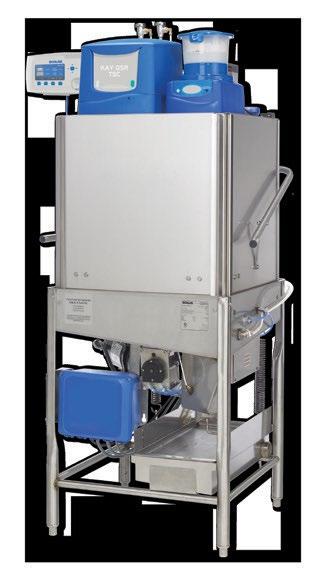

Some P&L statements are examined with analytics that demonstrate every expense as a percentage of sales. It allows individual costs to be tracked to see if they grow out of line with revenue and why. For quick-service restaurants, food cost and labor cost are the two items most closely tied to sales. Restaurant managers should be constantly examining sales – not only for the revenue levels, but also for the adjustments they might suggest for product and labor needs. “The use of detailed, line-item budgets is a priority for us in controlling these items,” Schory said. “We have daily calls with regional general managers and weekly meetings with district managers to gain insight and accountability to results.”

Syed said for managing food costs, there are several things managers should be doing, such as using a build-to-inventory ordering system (with management taking an on-hand count plus accounting for daily item usage before placing an order) and using RTI Connect, an inventory-management reporting platform that pinpoints specific variance items that help identify opportunities for food savings. “RSI P&L benchmarking is incredibly useful in helping us track our line items versus national and upon-request,” Syed said. “We are also excited to see the results RTI brings once fully implemented.”
“Adjustments should be made daily for most items before the P&L is generated,” Schory said. Such careful tracking and willingness to modify orders based on sales trends and changing needs ensures that there are no surprises when the P&L is tabulated and reviewed.
Tracking sales by hours, days and weeks also helps with labor management, giving the restaurant manager a guide for how many people will be needed to meet the restaurant commitment to good service without overstaffing. “We are required by New York City law to create schedules two weeks in advance, so we pre-populate projection sheets in advance with sales, weather and budgeted labor after accounting for current trends as well as any national promotions that might be hitting during that week,” Syed added. “We then make schedules after seeing how that week shapes based on that projection. Many local jurisdictions prohibit cutting labor on the spot, so we feel this is the best we can really do to manage the business without hurting it as well as complying with all laws.”

The organizations prioritize P&L performance with their constant focus on it throughout their organizational charts. Syed Restaurant Enterprises further emphasizes the importance of hitting quarterly P&L benchmarks by tying them to a bonus program for restaurant managers. Those timely reviews, with top-to-bottom participation and open communication about profit and loss statements, are all part of the regimen that leads to quick diagnoses of problems and, ultimately, a healthy bottom line.
Just as recommended checkups – and the adjustments to lifestyle and diet that may come from them – keep people healthy, regular attention to profit and loss statements and the adjustments made to rehabilitate problems keep a company healthy. n


2020 ISSUE 2 | Flame 21 “ Guests love mints and feel special and valued. Mints are an extra touch that leads to increased revenue! ~ BK® Franchisee Owner ” Join other Burger King Franchisees, who are using tasty BK® Mints as a simple treat that keeps customers coming back. 61% REPEAT CUSTOMERS. INCREASED CUSTOMER LOYALTY. A BOOST IN YOUR BOTTOM LINE. Visit hospitalitymints.com to get started with custom-wrapped mints today. Now at’ s SWEET!
SEAN IRELAND is the NFA associate director of communications. You may reach Ireland at seani@nfabk.org or 678-797-5165.
Nancy McLamore Nancy McLamore
BURGER KING’s First Lady
Though she probably would have rejected the idea of being called the “queen” behind the BURGER KING®, Nancy McLamore was certainly the brand’s first lady, a valuable ambassador who helped grow the company from a single restaurant in 1954 into an international franchising behemoth.
As the wife of BK® co-founder James W. McLamore, Nancy Nichol McLamore was the quiet but devoted partner who inspired her husband, supported his business and charitable endeavors, raised their family and demonstrated to all the importance of kindness, selflessness and community involvement.
Mrs. McLamore, 93, died May 23 after a brief illness.
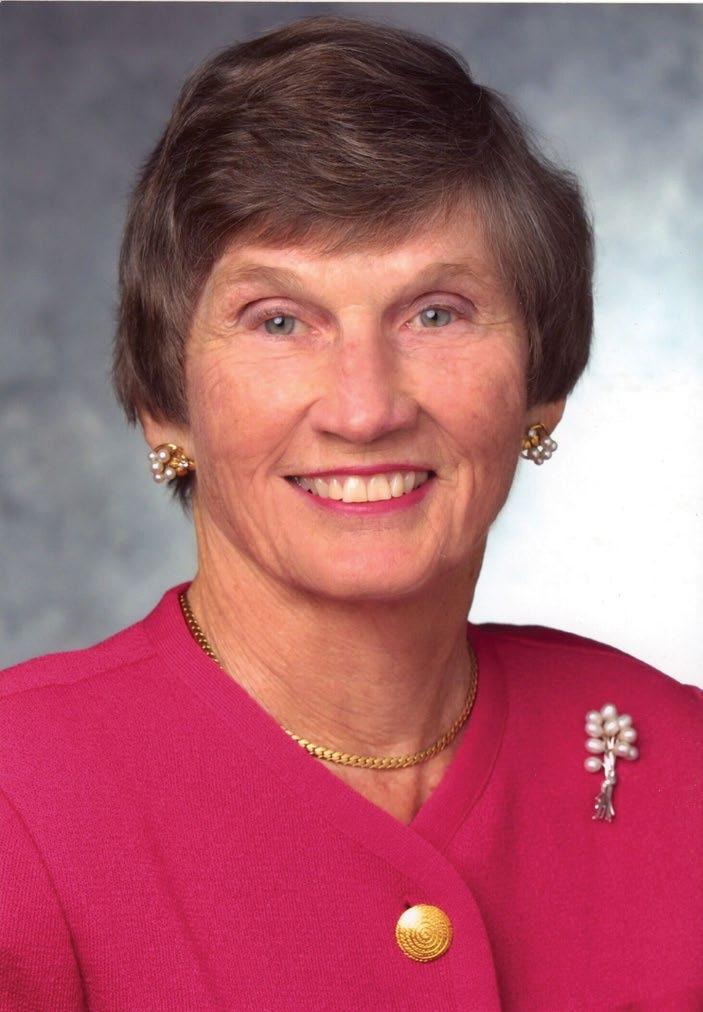

Her passing touched off fond remembrances of her and her late husband from family, longtime franchisees and others connected with the BK brand in its early years through 1967, when it was sold to Pillsbury, and into the 1970s, when her husband retired from the company. He later returned and served as a consultant for BURGER KING in the 1990s.
“She was always so supportive and loving to Dad,” said one of her four children, Sterling “Whit” McLamore. “She was incredibly organized and selfless throughout her life.”
“She was the Energizer bunny. She did it all and made it look easy, and she didn’t stop!” recalled her youngest daughter, Susie Bernard. “She was also an example of one of the most hospitable people I’ve ever observed. At holidays, there was usually an
dadditional single person or old person at the family table who didn’t have their family around or anywhere else to go, and they were always welcome at her table.”
Mrs. McLamore was born in 1926 to Dr. E. Sterling Nichol, the founder of the Miami Heart Institute, and Dorothy Evans Nichol. A graduate of Miami High School, she attended Cornell University, where she met her future husband, Jim. “She was a gorgeous blond, enthusiastic, optimistic and encouraging,” Bernard said. “Mom always wanted to be a mother and have four kids. She teased that she went to college to get her M.R.S. degree. I think she saw in my dad a hard-working, honest, humble, witty, goal-oriented man who needed what she brought to their relationship.”
They married in 1947 and moved to Delaware, where they started their family while Jim McLamore entered the restaurant business as a manager at a YMCA cafeteria before opening his own restaurant. They later moved to Miami, and McLamore opened the Brickell Bridge Restaurant. Local restaurateur Dave Edgerton got to
22 Flame | 2020 ISSUE 2 N (1926-2020)
know McLamore as a guest of the restaurant, and over time they became friends.
As the McLamore family continued to grow, Edgerton and Jim McLamore became closer, and when Edgerton opened his first Insta Burger King, he convinced McLamore to join him in the new concept. McLamore sold his restaurant and joined Edgerton to expand their market share of the new brand. From this small start in the Insta Burger King concept came the launch of today’s BURGER KING brand.
The McLamores’ marriage was one of equals. “They each had their realm of responsibility and control and that created a mutual respect and trust within their partnership,” Bernard said. “Dad didn’t try to exert his preferences too much on the home frontier, and she trusted him completely on the business frontier. It made for a very compatible marriage that we kids were blessed to thrive under.”
“She took care of raising the four children almost entirely by herself,” Whit McLamore added. “Money was very tight throughout the building of the business, so she was incredibly resourceful in stretching every penny they earned.”

As McLamore and Edgerton perfected their business operations, developed the famous WHOPPER® hamburger and began to grow the BURGER KING brand, Mrs. McLamore was there every step of the way. “Jim was the face of the brand, and Nancy, with the four kids, was behind the scenes, but always present,” said longtime BK franchisee Jay Amarosa, now retired. “She developed and kept everything together at home while Jim built the brand.”
“Mom would wake up when dad would come home late at night, and they would sit on the porch and talk over the day – the struggles and the highlights,” Bernard said. “This was their habit, even when she had four active kids to wake up to the next morning when he left at 6 a.m. to start his day again.”
No one was more aware of what her bright presence meant to their partnership than Jim McLamore himself. “Nobody could

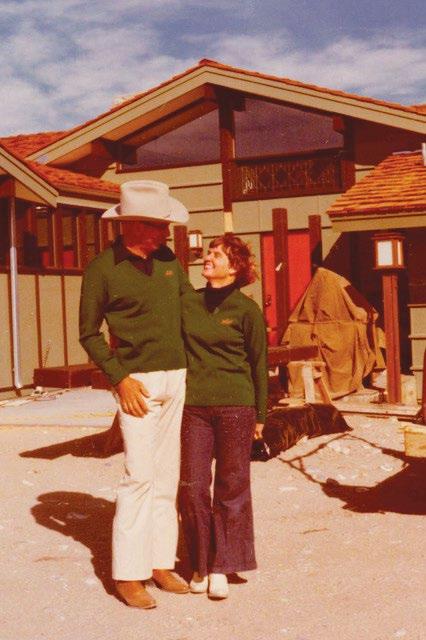
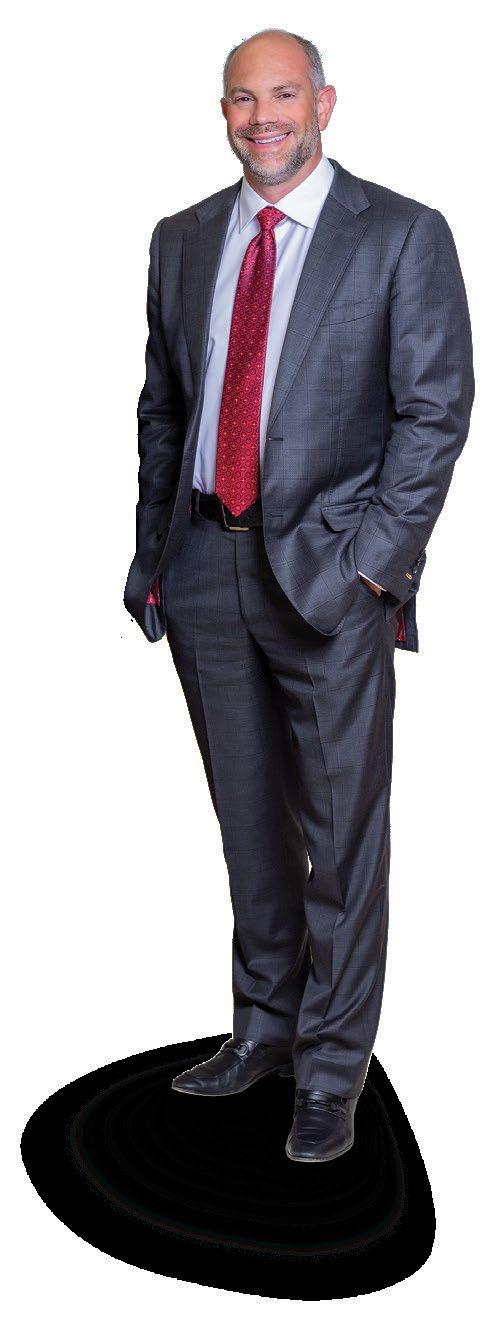

2020 ISSUE 2 | Flame 23
Chris Hall, Managing Principal, Hall Financial Advisors, llc named #1 in West Virginia on Forbes Best-in-State Wealth Advisor List 20201 and Barron's 2020 Top 1,200 Advisors List2 Action items to consider during market volatility ◆ Rebalance your 401k allocations ◆ Consider increasing contributions into employer sponsored plans ◆ Make 529 contributions ◆ Consider a Roth conversion ◆ Utilize tax loss harvesting to offset gains in concentrated positions ◆ Review your cash reserves Our team believes in providing advice to promote the well-being of a comprehensive, long term plan. Call or visit our website HallFinancialAdvisorsLLC.com. #1 1.
Research,
2.
Wells Fargo Advisors Financial Network and Hall Financial Advisors are not legal or
You should consult with your attorney,
and/or
planner
Investment products and services are offered through Wells Fargo Advisors Financial Network, LLC (WFAFN), Member SIPC. Hall Financial Advisors, LLC is a separate entity from WFAFN. 866.865.4442 1101 Rosemar Road, Parkersburg, WV 26105 416 Hart Street, Marietta, OH 45750 00547 Continued on page 24
Ranking algorithm
based on industry experience, interviews, compliance records, assets under management, revenue and other criteria by SHOOK
LLC, which does not receive compensation from the advisors or their firms in exchange for placement on a ranking. Investment performance is not a criterion.
The
Barron’s
Top 1,200 Advisors List rankings are based on data provided by thousands of advisors. Factors included in the rankings were assets under management, revenue produced for the firm, regulatory record, length of service, quality of practice and client retention.
tax advisors.
accountant
estate
before taking any action.
Jim and Nancy McLamore were a well-matched and devoted couple.
Nancy McLamore
Continued from page 23
have filled my life with more optimism, happiness and confidence than she was able to do,” he wrote in his book, “The Burger King: A Whopper of a Story on Life and Leadership,” which was released after his death in 1996 and re-released with additional commentary earlier this year.

“Nancy came to me as a powerful and refreshing breath of spring at precisely the time I needed someone close to remind me that life could be wonderful, worthwhile and promising. Nancy is the kind of person who looks at life in a positive and upbeat fashion. I have never known her to be ‘down’ or depressed, and I have never seen her dwell on negative thoughts. Her mission in life always seems to be one of spreading joy and happiness wherever she can. She does this with extraordinary consistency.”
Jim McLamore’s description of his wife’s personality was echoed again and again by her family and friends in the days after her death. Whether it was by showering a grandchild with special attention, visiting the elderly in hospitals or greeting people at BURGER KING conventions, even after her and her husband’s official roles with the company ended, Nancy McLamore made those around her feel valued and appreciated.
Amarosa was a franchisee in the Tampa, Florida, area with Whit McLamore in the 1990s. Their families became close, with the Amarosas often meeting Jim and Nancy McLamore at family gatherings or BK events. Amarosa called her outgoing, warm and personable and noted that she never failed to ask about his family and never forgot a detail about them, no matter how long it had been since she last saw him. “She was an ambassador for

the brand,” he said. “She did a great job with her kids. I know the whole family, and they are all wonderful people and successful in their own rights. She raised well-rounded children, and she was well-received by everybody.”
Whit McLamore said his mother always impressed upon her children the importance of being kind to people, and that edict included everyone from close friends to strangers. Bernard remembers times when she and her mother would visit people shut in their homes or at hospitals or old acquaintances who had no one else to see them.
Friends who grew close to the McLamores also noted her care for others. “I met Nancy on the golf course when I was playing with Jim. Nancy was always the kindest and most considerate of people,” said former franchisee Ron Devine, who owned BK restaurants for 35 years and served 15 years on the board of directors of the National Franchisee Association. “They had the amazing ability to make everyone they touched feel special, myself included.”
“[She] was a life force to many, and I count myself one of the chosen,” said former Burger King CEO Jim Adamson, who noted that she had called him a week before she died. “I am truly humbled by that and the many overtures she gifted both myself and my family. I am not by nature an outgoing person, but with the combination of your father and mother, my family felt so welcome and enhanced by our relationship that our time in Miami was a positive productive experience. As we gain experience in life, we shed the superficial. Nancy had that nailed and made us realize that success can be helpful, but not the end all.”
Her personality manifested itself in a variety of community endeavors. After retiring from BURGER KING, Jim McLamore was involved with several organizations, including serving as the chairman of the board of trustees of the University of Miami, investing in the Miami Dolphins professional football team and working with the Orange Bowl Committee, Fairchild Tropical Botanic Gardens and others. Nancy McLamore would host countless functions at their home to support those efforts. “Mom was just very keen on supporting dad’s interests. They became hers for a long time. She was his first lady, and she was the ultimate partner and hostess for all his boards, chairmanships and business ventures,” Bernard said.
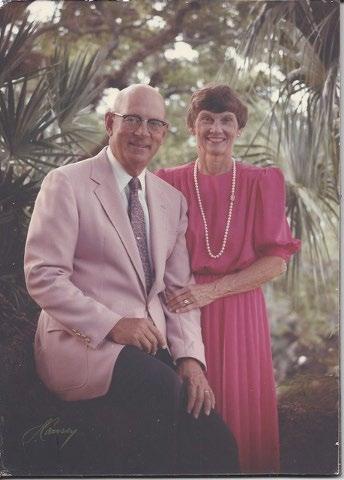
That’s not to say that she didn’t have her own causes. “I remember as a young boy, maybe 12 or 13 years old, going with
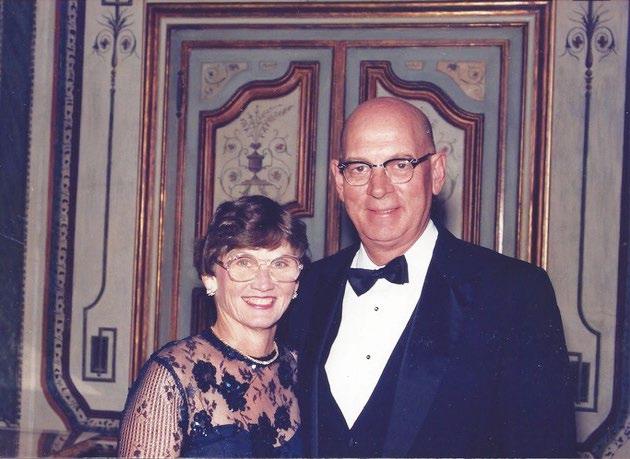
24 Flame | 2020 ISSUE 2
Nancy McLamore stood beside her husband in all his business and charitable endeavors.
her to paint bedrooms at the children’s home where she volunteered,” Whit McLamore said. “Years later they honored both her and my father by dedicating the McLamore Children’s Center near downtown Miami, which is a part of the Children’s Home Society of Florida now. She volunteered at a local hospital as a ‘Grey Lady,’ and was one of the founding members of the Beaux Arts Society at the University of Miami Lowe Art Museum.”
“Mom volunteered at the Children’s Home Society for a long time, and when they finally had the finances and the opportunity, they gave significant funds to the organization,” Bernard said. “Mom loved kids, her own and others. She always wanted to be a mom, and this was a natural way to give back to her community.”
Nancy McLamore was also a supporter of the BURGER KINGSM McLamore Foundation. “Through the McLamore Family Foundation, Mrs. McLamore helped establish the James W. McLamore Whopper Scholarship award, which provides $50,000 to three top high school seniors. This award and the generosity of the McLamore family has provided more than $1 million in scholarship awards,” said Amanda Israel, BURGER KINGSM McLamore Foundation executive director.
“Her passion for creating a brighter future for students continued the legacy of her husband and will forever be a part of our organization, and our deepest sympathies are with the McLamore family during this difficult time,” Israel added. “In honor of her legacy of philanthropy and care for future generations, we have established the Nancy McLamore Legacy fund to award a scholarship in her honor each year.”
The McLamores were involved in many charitable efforts because of their love and appreciation for the Miami area. Bernard said they both credited the city and south Florida region as part of why BURGER KING grew so quickly. They both also loved and cared for the brand and company they helped to create.
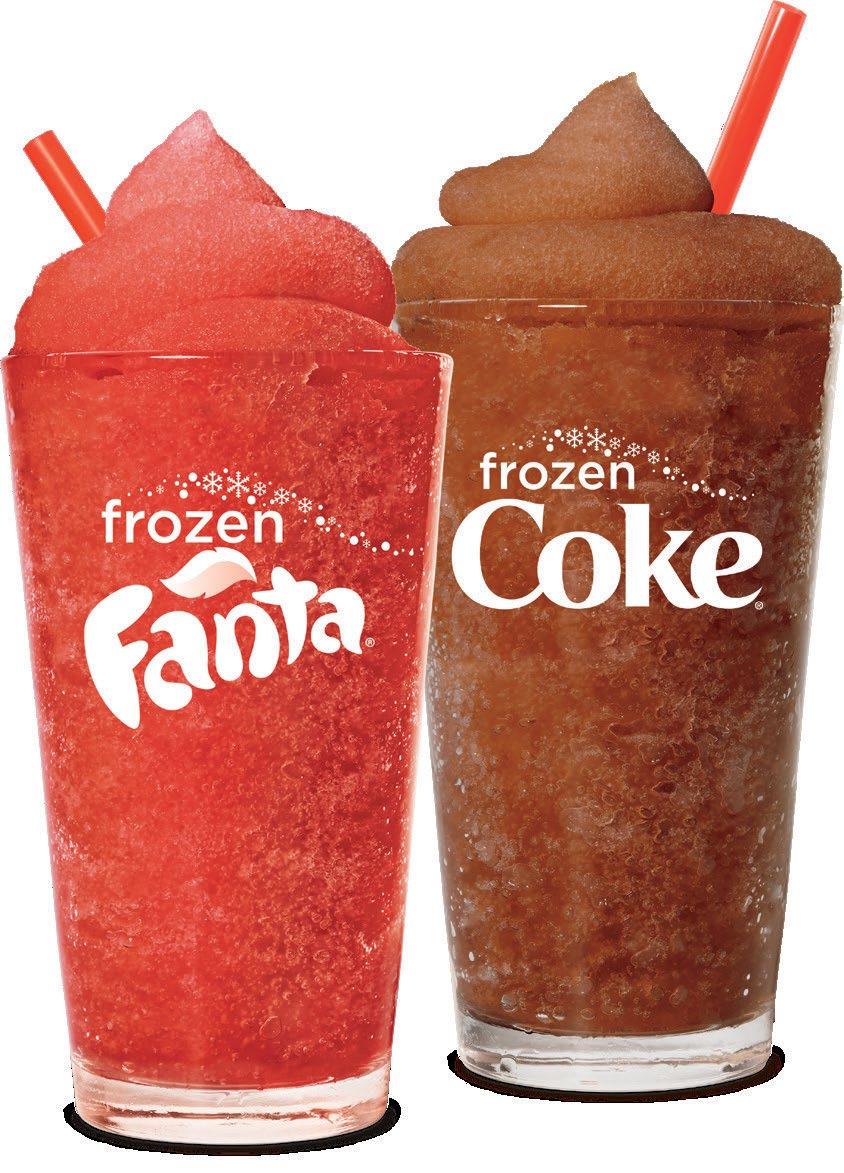

“Jim and Nancy made such a difference in many people’s lives just by the way they lived their own,” Devine said. “Jim was a true gentleman. Nancy was kind and a great ambassador for the BURGER KING brand. They were the perfect couple to be our brand royals. Nancy, just by her attendance, brought a level of class and honor to the brand. Spending her time after Jim passed attending the conventions is just a small example of the level of care the McLamores had for the BURGER KING system.”
Most are familiar with the proverb that “behind every great man, there’s a great woman.” In the case of Nancy McLamore, however, it must be amended to read that “beside every great man, there’s a great woman.” Their partnership yielded a large happy family now grown to its fourth generation and a thriving business with thousands of locations spread around the globe. Few have been as blessedly successful.
“My father was a great man, but he wouldn’t have been had Nancy not been by his side,” Whit McLamore said. “She was the glue that held it all together, for him personally and for all of her four kids, nine grandkids and 12 great-grandkids.”
“Mom was a generous person in the true sense of the word,” Bernard added. “She was fair. She was smart. She was adventurous. She was opinionated. Most of all, she loved well.”
A celebration of Mrs. McLamore’s life is being held later due to the novel coronavirus pandemic. The family requests that those wishing to make a memorial contribution do so to the McLamore Children’s Center, a part of the Children’s Home Society in Miami, the Fairchild Tropical Botanic Garden or a charity of their choice. n
2020 ISSUE 2 | Flame 25 C M Y CM MY CY CMY K
BK Founder’s Book Being Reissued With New Material
The family foundation of one of the founders of the BURGER KING® brand is republishing his autobiography more than 20 years after it was first issued.

Though Jim McLamore’s story about how he and a partner launched the restaurant chain may be well known to those in the BK® system, the lessons it offers on entrepreneurship, grit and integrity are timeless and especially relevant in the aftermath of the nation’s COVID-19 crisis.
“The Burger King: A Whopper of a Story on Life and Leadership” was written by McLamore and published in 1997, a year after his death. Now, his grandson, Tucker McCormack, a director of the McLamore Family Foundation (a separate entity from the BURGER KING SM McLamore Foundation), is leading the effort to have it reissued with new material and expanded content, including new pictures, stories and videos and other material that can be found on the website www.theburgerkingbook.com.
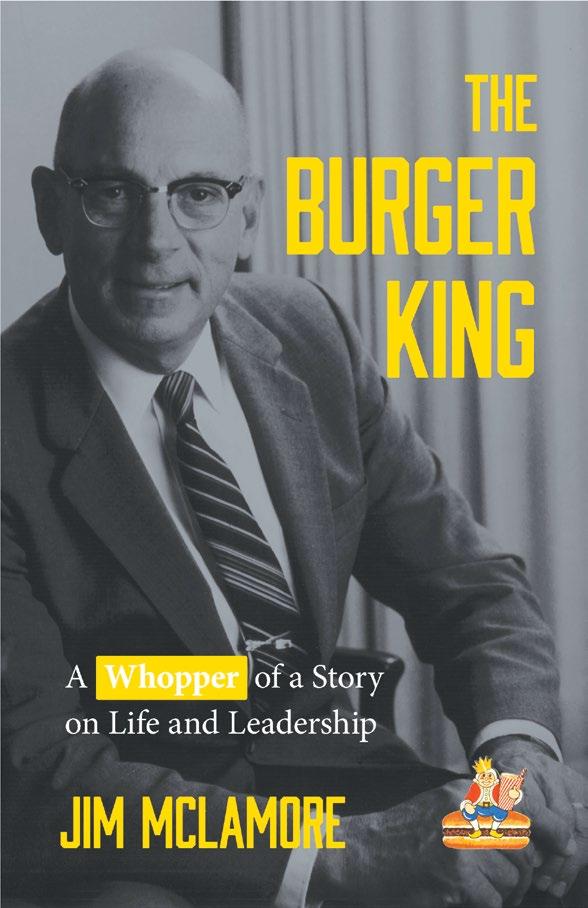
McCormack said it’s a good time to revisit the lessons from his grandfather’s book. “I think his legacy is one of amazing leadership and ethics where he focused a tremendous amount of time on other people,” McCormack said. “This is a story of positive capitalism when there is so much talk about how capitalism is bad or takes advantage of people. In all the stories I came across he helped other people, in their education, careers or personally. He helped people achieve the American dream.”
McLamore and his business partner, Dave Edgerton, overcame many struggles over two decades as they built the BURGER KING brand from a small “15-cent burger and shake operation,” as Edgerton put it, into a dynamic franchising organization with hundreds of restaurants across the country. The book details their mistakes and successes on the journey and how they helped others build their own entrepreneurial organizations. “The whole book is full of anecdotes, stories and mistakes of his career as an entrepreneur. I think it is highly educational and informative to those starting and growing a
business,” McCormack said.
After McLamore and Edgerton sold the system to the Pillsbury Co., McLamore spent five years as the CEO before retiring and focusing on philanthropic pursuits. He served on the board of several large corporations and dedicated his life to serving the south Florida community as chairman of the University of Miami. He also worked as chairman of the United Way, as a member and chairman of the Orange Bowl Committee and was an avid gardener and chairman
at Fairchild Tropical Botanic Garden. He reinvested in the educational institutions that impacted him at Northfield Mount Hermon and Cornell University.
Sales of the book, which is available through online outlets and in bookstores, support the McLamore Family Foundation and McLamore’s key interests promoting education, entrepreneurship, leadership, youth activities, and cultural, civic and community service programs. “We focus our philanthropy mostly around education and the causes Jim cared about,” McCormack said. “We work with the BURGER KINGSM McLamore Foundation by providing at least three $50,000 James W. McLamore WHOPPER scholarships per year as well as support other institutions, including the University of Miami, Cornell, Northfield Mount Hermon and SMU,” McCormack said.
“We are seeking to spread Jim’s legacy. All profits received by the McLamore Family Foundation from book sales will go to scholarships and fulfilling our philanthropic goals.” n
26 Flame | 2020 ISSUE 2
“I think his legacy is one of amazing leadership and ethics where he focused a tremendous amount of time on other people.”
– Tucker McCormack, McLamore’s grandson






2020 ISSUE 2 | Flame 27 Cyber Liability • Employment Practices Liability • Alcohol Liability Commercial Auto • Professional Liability • Umbrella Important coverage tailored for Elevanta members As a business owner, you face a multitude of risks and protecting against those risks can be difficult. With coverage from co-brokers, Elevanta and Lockton Affinity, it’s easy. We offer three core insurance products—General Liability, Property and Workers’ Compensation—and additional products, including: Key program benefits
with comprehensive coverage, you have access to: The Elevanta Insurance Program is administered by Lockton Affinity, LLC d/b/a Lockton Affinity Insurance Brokers LLC in California #0795478. Coverage is subject to actual policy terms and conditions. Policy benefits are the sole responsibility of the issuing insurance company. Coverage may be provided by an excess/surplus lines insurer which is not licensed by or subject to the supervision of the insurance department of your state of residence. Policy coverage forms and rates are not subject to regulation by the insurance department of your state of residence. Excess/Surplus lines insurers do not generally participate in state guaranty funds and therefore insureds are not protected by such funds in the event of the insurer’s insolvency. Elevanta will receive a royalty fee for the licensing of its name and trademarks as part of the insurance program offered to the extent permitted by applicable law. Visit Elevanta.LocktonAffinity.com to get started. (844) 403-4947 or Elevanta@LocktonAffinity.com. Complimentary policy reviews Concerned you don’t have the right protection? Email Lockton Affinity your current insurance policies and we will review them free of charge to ensure your franchise has the right coverage and limits in place. Risk management tools
offer risk management tools like loss prevention plans, risk management articles and webinars to help you mitigate risk—and lower your insurance premiums—over time. Efficient interactions
for coverage with a quick, downloadable application. In the event of an incident, we work to settle claims fast so that you can get back to business. Quick price indication
developed a simple price indication tool that takes less than five minutes to complete. We will review your submission and respond with an indication, allowing you to make a financially informed decision about your insurance.
Along
We
Apply
We
New Dashboards Offer Innovative Home Delivery Insights Amid Pandemic, RSI Zeroes in on Tools to Benchmark Profitability

The BURGER KING® brand was built on the pride, passion and purpose of restaurant operators who delivered on the immediate needs of their guests. That commitment to service positioned our brand as a global icon recognized and trusted by millions worldwide. And now, that drive to succeed, instilled in each restaurant operator generation after generation, is helping us endure the most difficult challenge we have ever faced in the brand’s history.
COVID-19 disrupted most aspects of daily living and forced our members to swiftly rethink their operations. While many were closing their doors, the BK® system was equipping restaurants and teams to safely face the immediate future. To adapt to an operational environment where consumer fear was at the forefront, operators leveraged the brand’s safety measures and turned to an untapped program – home delivery – to keep thousands of restaurants running, teams employed and guests fed when they needed it the most.
With people across the country heeding the advice of health experts urging them to shelter in place, the demand for restaurant home delivery spiked to record levels. And just as noticeable was the need for our members to track, measure and benchmark this relatively new service mode. Leveraging its unique access to restaurant data and a robust analytics platform, RSI launched the Service Mode dashboard on its mobile analytics app in record speed.
Used by thousands via the RSI Analytics mobile app, the new dashboard provides critical insight into business and profitability performance. At a quick tap of a button, members can access sales and ticket averages per day by all six service modes: Eat In, Take Out, Drive-Thru, Delivery, Kiosk and Mobile Ordering.
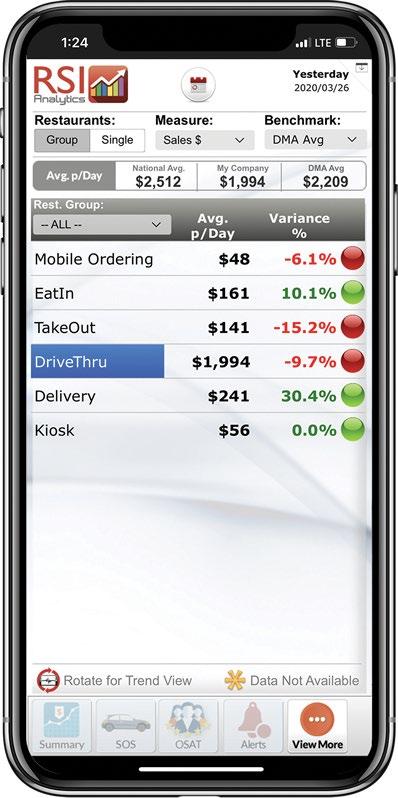
While working with third-party delivery partners offers many benefits, their

online portals lack the ability to analyze and reconcile sales. To bridge that gap, RSI introduced an unmatched platform – My Delivery InsightsSM – where members can access delivery sales transaction and partner data in one centralized view. The unique tool collects sales, commission and deposit data submitted by DoorDash®, Grubhub®, Postmates® and Uber Eats®, and compares it to restaurant POS data and then conveniently surfaces the variances between the two to make reconciliation much easier.
RSI’s ability to pivot in times like these is largely, in part, due to the deep and wide toolset we have proudly built over the past three decades. “Despite all the challenges presented by COVID-19, RSI continues delivering on its commitment to the brand and our members to provide innovative solutions and insights into their individual and collective business performance,” said Joel Neikirk, RSI president and CEO. “The introduction of the My Delivery InsightsSM and Service Mode dashboards underscores our ability to remain agile and flexible in the current environment and further
tool. By quickly surfacing anomalies between third-party partner and POS data, members have saved a tremendous amount of time and money. Andrew Geiger, owner of HG Foods LLC –a BK® franchisee who co-owns 23 restaurants with his parents, Gary and Jennifer Geiger, on the West Coast – has experienced firsthand the significant benefit of this new platform.
“My Delivery InsightsSM has become a proven and invaluable asset to our organization in reconciling efficiently and identifying and solving potential issues almost instantly. We no longer have to navigate the difficult landscape of the third-party delivery partner portals,” said Geiger. “What used to take our bookkeepers multiple hours, days and sometimes weeks to reconcile now is done within five minutes. Each time I had a request, they used to stop me at the door, and now my requests are welcomed.”
Geiger said that the new platform has exceeded his expectations at every turn and encourages members to use it. “If you don’t, you are handicapping your organization,” he said.
RSI is working collaboratively with its board, comprised of BK franchisees, My Delivery InsightsSM and Service Mode “power users,” and RBI to refine and enhance these tools. Our mission, in addition to ensuring supply at best cost, is helping drive member profitability by continually improving the efficiency of and expanding our technology offerings. Challenging times call upon leadership, and RSI will always roll up its proverbial sleeves to deliver. n
strengthens our position as a leader in the nation’s supply chain.”

Since its introduction in April 2020, more than 1,500 RSI web users are regularly leveraging this powerful reconciliation
For more information on the new tools or assistance with functionality, contact the RSI Help Desk at helpdesk@rsilink.com or 305-529-2123.
28 Flame | 2020 ISSUE 2

BURGER KINGSM Family Fund: A Helping Hand During a Global Pandemic
Adevastating hurricane. A fire. A tragic car accident. An unexpected illness. Floods, tornadoes and earthquakes. None of us could have imagined that we would be adding “global pandemic” to the types of relief the BURGER KINGSM Family Fund would provide this year. The ongoing impact of COVID-19 is unlike anything we have seen in our lifetimes.
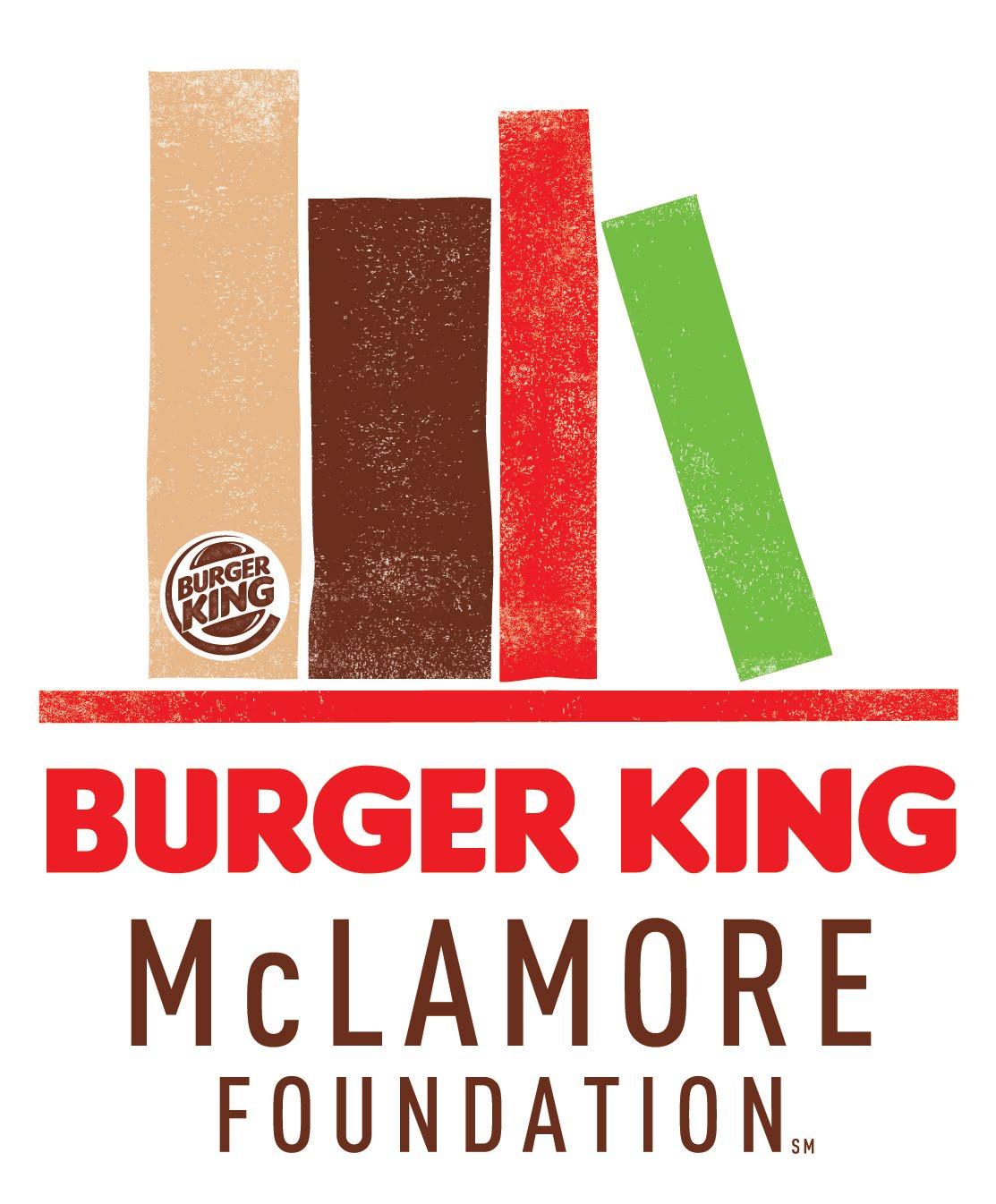
For the lucky ones, kitchen tables became home offices, parents added “teacher” to their résumés and cabin fever led to TikTok challenges and lots of Amazon deliveries. For those families that haven’t been so lucky, unpaid bills piled up as one or both sources of income were lost. Some lost loved ones who died alone because it was just too dangerous to go into the hospital to say their last goodbyes.
Sadly, these are the situations we see come to the BKSM Family Fund almost
daily, along with the normal tragedies of life. We thank you for your continuous support as we continue to navigate the surge in cases due to COVID-19. Given the ongoing impact of this global pandemic, the BKSM Family Fund is extending a helping hand to those BK® employees who are suffering unexpected hardship or emergencies because of COVID-19. As of June 9, the Family Fund has been able to award grants totaling over $33,000 to 29 individuals and their families. We will continue to prioritize aid to the following employees:
• Employees who are unable to work after testing positive for COVID-19.
• Employees age 65 years or older or those individuals with high-risk conditions as outlined by the CDC, who are unable to work to prevent getting sick with COVID-19.
• Employees living with an individual with high-risk conditions as outlined by the CDC, who are unable to work to prevent getting that individual sick with COVID-19.

• Single parents who are unable to work because of school or day care closures.
So many of our employees have been affected by this terrible disease already, and many still need assistance. Your donations are what make it possible for us to lift our family members up in their times of need. We know that we are all facing our own hardships, but if you can contribute, your donation can make a huge impact in the lives of our BK employees. Every dollar makes a difference! Donate at www.bkmclamorefoundation.org/donate/.
• $60 can feed an employee for a week.
• $500 can cover a deductible or help
30 Flame | 2020 ISSUE 2
with insurance costs from a hospital visit.
• $4,500 assists us in providing a full grant or three-plus emergency grants.


During this time, we also want to acknowledge the great sacrifice our BURGER KING® employees are making daily. There are so many heroes of the pandemic, not only nurses, doctors and all health care workers, but also our team members who keep going to work every day, serving customers, putting their health and the health of their families at risk. You are also heroes. We could not continue to move the brand forward without your tireless dedication. Thank you!
One small way we can show our appreciation is to be there when our employees need us the most. Here is just one story from an employee who needed us. Chandra is a BK company store team member who contracted COVID-19 and sadly lost her mother to the disease as well. She has five children who depend on her. Her sister sent us this beautiful note:
Please thank your corporation for its unyielding assistance on behalf of Chandra. As a professional for several
employers throughout my career, I have never encountered an organization that truly cares about its employees, at any level, as the Burger King Corporation does. It is absolutely remarkable, and my family and I are entirely grateful. Chandra is still in critical but stable condition due to COVID-19 and is fighting for her life. At a time of sadness from losing our mother last Sunday to the coronavirus,
your organization has continued to put a smile on our faces for the kindness it has exhibited toward our sister. Kudos to you guys!
We are so grateful that after two long months recovering in the hospital, Chandra was finally able to go home at the beginning of June. Your donations helped put Chandra and her family’s mind at ease so she could concentrate on getting well and returning home.
Employees in need of immediate, short-term assistance can apply for a grant from the BK Family Fund at www.familyfund.bk.com. Please note that a sponsor and appropriate evidence is required. We urge you to share this information with your employees and let them know these resources exist to help them through this and other difficult times. If you have any questions about the application process, please email Maria Toscano at mtoscano@rbi.com.
Family is the most important thing in the world, now more than ever. Thank you for making the BK family one of strength, love and perseverance. Stay safe and strong and know that we are all in this TOGETHER.
Please consider donating to the BKSM Family Fund today!

No matter how large or small, your donation will help a Burger King® employee who is in great need. If you have already donated this year, please encourage your fellow Franchisees and Vendor Partners to support the cause as well

www.bkmclamorefoundation.org/donate/
If you have any questions, email Maria Toscano at mtoscano@rbi.com
2020 ISSUE 2 | Flame 31
you would like to donate ‘ Burger King Family Fund’ from the drop down menu under ‘Designation’
the amount
TM & © 2020 Burger King Corporation. All Rights Reserved.
n
One small way we can show our appreciation is to be there when our employees need us the most.
Communications Take On Added Importance in Wake of COVID-19 and Civil Unrest
As I write this article in June 2020, employers throughout the United States are all struggling with how to work in a pandemic, with rules and regulations that seem to change just as soon as you learn them and that can differ from those in the next town, as well as how to respond to civil unrest seeking changes to end racial injustice.

It can all seem overwhelming and as if there is no safe course of action, with every decision fraught with potential landmines from just some bad publicity to perhaps loss of life. Sometimes, it can even seem like a choice we make, or a word we choose, will be deemed a political statement when all you are trying to do is save your business. While I would like to tell you that this article will have all the answers, it will not. You can count on that at least. But it does contain reminders of employment principles that will hopefully get you through most of these turbulent times.
As regular readers of this column will know, I place a strong emphasis on communicating with all employees, from the lowest to the highest. Generally, those prior columns have focused on communications for setting forth clear and consistent expectations and providing employees with feedback regarding performance relative to those expectations.
None of the current events change this fundamental principle of a good working environment that is less likely to result in a legal claim. However, while communications remain important, it is also necessary on the part of the communicator to be aware of the needs and wants of the target audience. While the communicator (i.e., you) need not agree with those needs and wants, it is important to be sensitive to them when communicating expectations and providing feedback. For example, simply acknowledging the fears and concerns of employees as they themselves navigate through
the pandemic and the unrest can go a long way toward diffusing a potentially confrontational situation if the expectation or feedback is “bad news” to the employee.
We all get bad news of one form or another during the week, and the way in which it is delivered makes a world of difference. Keep that in mind as you communicate with employees, and do not hesitate to overcommunicate not only your expectations but also how things are going for the business and what your plans are for keeping the business going.
by DOUGLAS H. DUERR
As you are communicating and making decisions, it is important to remember that the laws governing workplace relations remain fully in effect. While perhaps there has been loosening of some aspects of the disability laws prohibiting medical inquiries, very little (if anything) has loosened up in the areas of employee and labor relations. So here are a couple of key reminders:
1
Although you can take employee temperatures and make COVID-19-specific inquiries, privacy of medical information (including those daily temperature readings if you keep them for some reason) continues. Keep confidential as much as you can, limiting those who are informed of any medical information.
2
In addition to the regular requirements regarding leave (e.g., Family and Medical Leave Act or leave under the Americans with Disabilities Act), the Emergency Paid Sick Leave (EPSL) and Expanded Medical Leave Act (EFMLA) provisions of the Families First Coronavirus Response Act are still out there and remain in effect until Dec. 31. On April 1 when these leaves went into effect

32 Flame | 2020 ISSUE 2
and businesses were scaling back and furloughing employees, you may not have had to comply with any of those requirements, so remind yourself of the requirements. It may be that when your employee says he or she does not want return to work yet you need to know why so that you can decide whether EPSL or EFMLA applies.

3Make sure you comply with workplace safety requirements. The Occupational Safety and Health Administration (OSHA) has issued guidance on measures to take, including assessing the potential for exposure to the virus and engineering and administrative controls that can be implemented to prevent employee exposure. The steps you take here not only reduce the likelihood of an OSHA violation but may also be central to whether an employee is awarded unemployment compensation for refusing to come to work. Also, labor unions are actively recruiting (and employees are reaching out to unions) over the issue of workplace safety, and there is no need to add that headache to your list.
4 Wage and hour laws still apply to those times when an employee is required to be on the premises or is performing work. Here, if you require an employee to undergo a temperature check or answer questions when showing up for work, the best course of action is to treat that time (including while waiting in line if necessary) as work time. This is a fact-specific inquiry under the wage and hour laws, but the trend (particularly under state law) even before the pandemic was to find similar pre-work activities compensable.
5 Remember that labor laws apply to situations when employees, either collectively or on behalf of co-workers, speak out on or act on (e.g., withholding labor) their workplace terms and conditions. Thus, like the strikes and picketing a few years ago in connection with demands for a $15/hour minimum wage, employees should not be disciplined or suffer an adverse employment action because, for example, they raise issues regarding safety or alleged systemic racism in their workplace.
6Try to keep politics (including your politics) out of your workplace conversations and communications. Although your business is an extension of yourself, your employees expect you to be focused on the business, including your customers and your employees. Keeping politics out of your workplace communication demonstrates that focus and, perhaps also importantly, allows you (particularly with the November elections) to instruct your employees to keep their politics\disputes out of the workplace too.
These are trying times for you and your employees. While there is always the potential for missteps and, even in the absence of a misstep, for employment claims, sticking to the basics helps minimize the risk and allows everyone to focus on keeping the business going until we get to the “new normal.” n
DOUGLAS H. DUERR is a partner at Elarbee Thompson, a national labor and employment law firm with an industry practice area focused on franchises. Learn more at www.elarbeethompson.com.
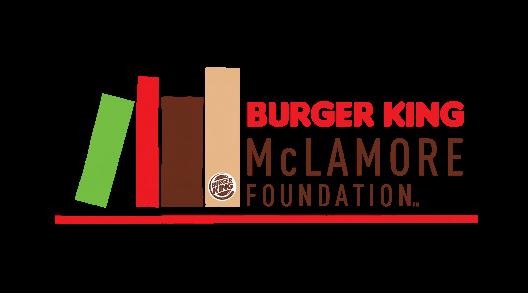
for helping us make 2020 a year where we empower individuals through education and emergency relief!
Six Employee Communication Strategies During Times of Crisis
Communication with our teams is always important, but in today’s environment, effective communication is vital. I know all aspects of our lives and the world have been affected. From a business perspective, we have some businesses that are doing well, and we have some that are struggling to just hang on and everything in between. But regardless of where you fall on that spectrum, my guess is that your relationships with customers and employees have been impacted.
Now, obviously, the role of a leader has changed significantly – almost overnight – due to the challenges that the world is facing following the coronavirus

pandemic. Just the way leaders interact with their employees is changing for most organizations. Effective leadership has probably never been more important than it is right now. But even in these strange times, we can take comfort in knowing that sound leadership principles are still effective. The execution of those principles might be changing, but foundational principles don’t change.
When I reflect on my 20 years working at Walt Disney World, one of the leadership principles at the heart of my Disney experience was this: Be relentless in communicating your vision with the team.
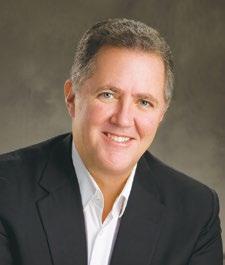
There is a photo of Walt Disney at a storyboard that is one of my favorites.
He always made sure everyone knew the vision.
Communication with our teams is always important, but in today’s environment, communication is vital. In this time of uncertainty, your people are hungry for information. I’m sure you’re all staying in touch with your people. I think we’ve learned more about Zoom in the last few months than we ever wanted to know.
by DENNIS SNOW
Here are six communication strategies that might be helpful for you right now.
34 Flame | 2020 ISSUE 2
1. Communicate with your team regularly.
Make sure you are communicating with your team regularly, at least twice a day, if not more. Whether it’s through virtual or in-person team huddles – socially distanced, of course – or any other approach, employees appreciate regular interaction with their leader. Just morning and afternoon Zoom check-ins can provide the connections that people crave during uncertain times. Err on the side of too much communication rather than too little. People naturally fill in communication gaps with their own speculation or information from the rumor mill.
2. Be a storyteller.
Stories provide a wonderful way of engaging the hearts of your people. Share stories that you’re hearing about team members that have gone above and beyond. Share customer success stories. Or, even better, have your people share stories. One way or another, be a storyteller.
3. Be upbeat, but realistic.
People appreciate optimism. They want to hear good things that might be
happening, but at the same time, they want to know that you understand the challenges, which leads to point No. 4.

4. Be transparent.
Not all news might be good, and you might not have all the answers. But people appreciate honesty. It’s OK to say, “This is the best information I have right now, but it could change tomorrow.” What really frustrates employees, especially during tough times, is when they have no idea what’s going on.
work during this difficult time. They are likely dealing with highly stressed and frustrated customers, and those customers are taking their frustrations out on your people. Let them know that you know that. Everyone loves to feel appreciated, especially now.
Are you communicating with your employees in a way that builds their trust in you as a leader during these extra challenging times? n

5. Be empathetic.
Your folks might be worried about their jobs, and they are definitely worried about their families. If people need to vent or express their concerns, let them do it. Again, you might not have all the answers to their issues, but at least demonstrate that you care.
6. Be appreciative.
Always, always, always let your folks know how much you appreciate their hard
DENNIS SNOW is the president of Snow & Associates Inc. Dennis worked with The Walt Disney Co. for 20 years and now consults with organizations around the world, helping them achieve their customer service goals. He is the author of “Unleashing Excellence: The Complete Guide to Ultimate Customer Service” and “Lessons From the Mouse: A Guide for Applying Disney World’s Secrets of Success to Your Organization, Your Career, and Your Life.” You can reach Snow at 407-294-1855 or visit his website at www.snowassociates.com.
2020 ISSUE 2 | Flame 35
BALANCE THE OPPOSITES
LEADERSHIP IS SUCH MEANINGFUL WORK
You are truly trying to influence how other people think so they make decisions to improve results in a sustainable way.
In trying to be a leader you are aspiring to be on the same level with Martin Luther King Jr., Oprah Winfrey, Mother Teresa and Gandhi. They all worked to be leaders.
One of the great challenges of leadership is deciding what topics to emphasize, what to say and what to do. What topics do you emphasize? What behaviors do you invest most of your time doing? Where do you place your energy?
These are very difficult questions to answer. It comes down to figuring out how to balance opposites.
11 OPPOSITES TO CONSIDER BALANCING
Here are 11 opposites you might have to make a decision on. How much of each do you think you should emphasize in your leadership situation?
ORIGINALITY VS. SUSTAINABILITY
How much time do you put into doing something different than anyone else has done, and how much time do you put into doing a common task over and over for the long term?
OPERATIONS VS. INNOVATION
Do you emphasize getting the work done or coming up with new ways to add value to other people?
STRATEGY VS. EXECUTION
by DAN COUGHLIN
Do you focus on deciding what the organization needs to do to achieve its desired outcomes, or do you focus on doing the planned actions as well as you can do them?
LASER-LIKE FOCUS VS. BROAD INTERESTS


Is it more effective for you to concentrate solely on the value you want your organization to be known for delivering, or is it better to travel widely, read broadly and talk with people from all walks of life?
ASKING QUESTIONS VS. TELLING STORIES
Do you think you are more effective as a leader in listening to a person’s ideas or in telling stories to large audiences?
36 Flame | 2020 ISSUE 2
RAISING THE LEVEL OF PERFORMANCE ACROSS THE ORGANIZATION VS. MEETING WITH AN INDIVIDUAL
Is it better for you to sit in your office and focus on developing a companywide professional development program or to invest those two hours in meeting with one individual to better understand the person’s purpose, values, passions and talents, and help guide the person to a role where he or she can be more effective?

PUBLIC SPEAKING VS. PRIVATE CONVERSATIONS
Is it a more effective use of your time to go around your organization giving public speeches at town hall meetings or to meet with individuals over a cup of coffee?
VISION VS. DETAILS
Do you think you should keep talking about your organization’s vision or about the details of an upcoming meeting?
GROWTH VS. EXCELLENCE
Is it better to always focus on growing revenue and adding sales people and adding new customers, or is it better to focus on improving day-to-day performance in every part of your organization?

Is it a better use of your time to work 70 hours a week, to sign up to coach four youth basketball teams or to train for a marathon?

EXERCISE VS. RELAXATION
Is it healthier for you to get up at 5 a.m. and put in five miles on the treadmill every morning, or is it healthier to curl up with a good book and then take a nap?
CONCLUSION
I don’t think the answer to any of those questions lies in choosing one or the other of the opposites, but rather in consciously deciding how much of each of them you want to emphasize or invest yourself in at a particular time. It’s like a painter going around the palette and deciding how much of each color to use in the painting at different places.
No one ever said leadership was going to be easy, but it can be incredibly meaningful as you make these choices and move them into action. n
Dan Coughlin is president of The Coughlin Company Inc., a management consulting firm focused on improving executive effectiveness and significance. He serves as a thinking partner for executives, managers and business owners toward improving their most important desired business outcomes. He does this through executive coaching for individuals and small groups. He also provides keynote speeches and seminars on effectiveness and leadership.
2020 ISSUE 2 | Flame 37 Payments made for today’s workforce 888.828.2270 | rapidpaycard.com | sales@rapidpaycard.com
TIME
WORK VS. TIME
YOURSELF TIME
YOUR FAMILY VS.
AT
BY
WITH
Making the Most of YouR Business’s Risk ManageMent
Akey component of running a business is managing risk. By evaluating, updating and maintaining your risk management program, you can help ensure the safety of customers and employees and reduce the chances of your business experiencing a serious accident or a liability lawsuit.
Developing a Risk ManageMent
Business
pRogRaM foR YouR
A successful risk management program can protect your employees and customers from harm and your organization from associated costs. Because of the program’s importance, your organization’s leadership should hold the responsibility of the risk management program planning.
When implementing a risk management program, consider the following fundamentals:
• State the reasons for having the program. These objectives will determine the depth and scope of the program’s development.
• Write a policy statement and explain it to all employees. It should clearly outline the objectives and demonstrate the intentions in achieving an effective program.
• Assign responsibilities to all employees, as everyone should have some responsibility and involvement in the program.
• Implement an efficient communication system, allowing quick contact to organization leadership, as employees likely have valuable insight. A review of the program’s results will also help identify areas that need modification.
Completing these four fundamentals will establish a supportive foundation for other elements of your risk management program. Keep in mind that all elements of the program cannot be carried out at once. Building a successful program takes time and planning.
The success of one phase will often lead to the initiation of the next logical phase.
RecoMMenDeD Risk ManageMent pRogRaM eleMents:
• Proper selection and personnel placement: Ensure the most qualified person is assigned.
• Establishing safety rules and procedures: Implement guidelines that employees are expected to follow. General and specific rules should be developed.

• Accident reporting, investigating and analyzing: Make provisions to ensure all accidents and injuries are reported immediately. Prompt investigation to uncover the real causes will allow for analysis and corrective action.
• Training: Develop a program to provide initial and continuous training for all employees.
• Inspections: Establish procedures to check regularly for unsafe conditions and unsafe acts within your organization.
• Emergency procedures: Implement procedures to follow, including first-aid treatment and handling serious injuries, fires or other natural disasters.
• Motivation: Keep your employees interested and continually involved in risk management efforts. This can include a safety committee, posters, handouts, incentive programs, etc.
siMple stRategies to iMpleMent in YouR Risk ManageMent pRogRaM:
Don’t rush hiring. A thorough hiring process will ensure the employee is a good fit for your business and will likely reduce turnover in the long run.
Tips: Pre-screen potential employees and hold one or even
38 Flame | 2020 ISSUE 2
two interviews with the same person before hiring them.
Minimize trips and falls. Slips, trips and falls make up most of all general industry accidents and cause approximately 15% of accidental deaths, second only to auto accidents.
tips: To prevent slips, trips or falls, remember to:
• Remove hazards by picking items off the floor, cleaning up any spilled liquids and avoiding extension cord use.
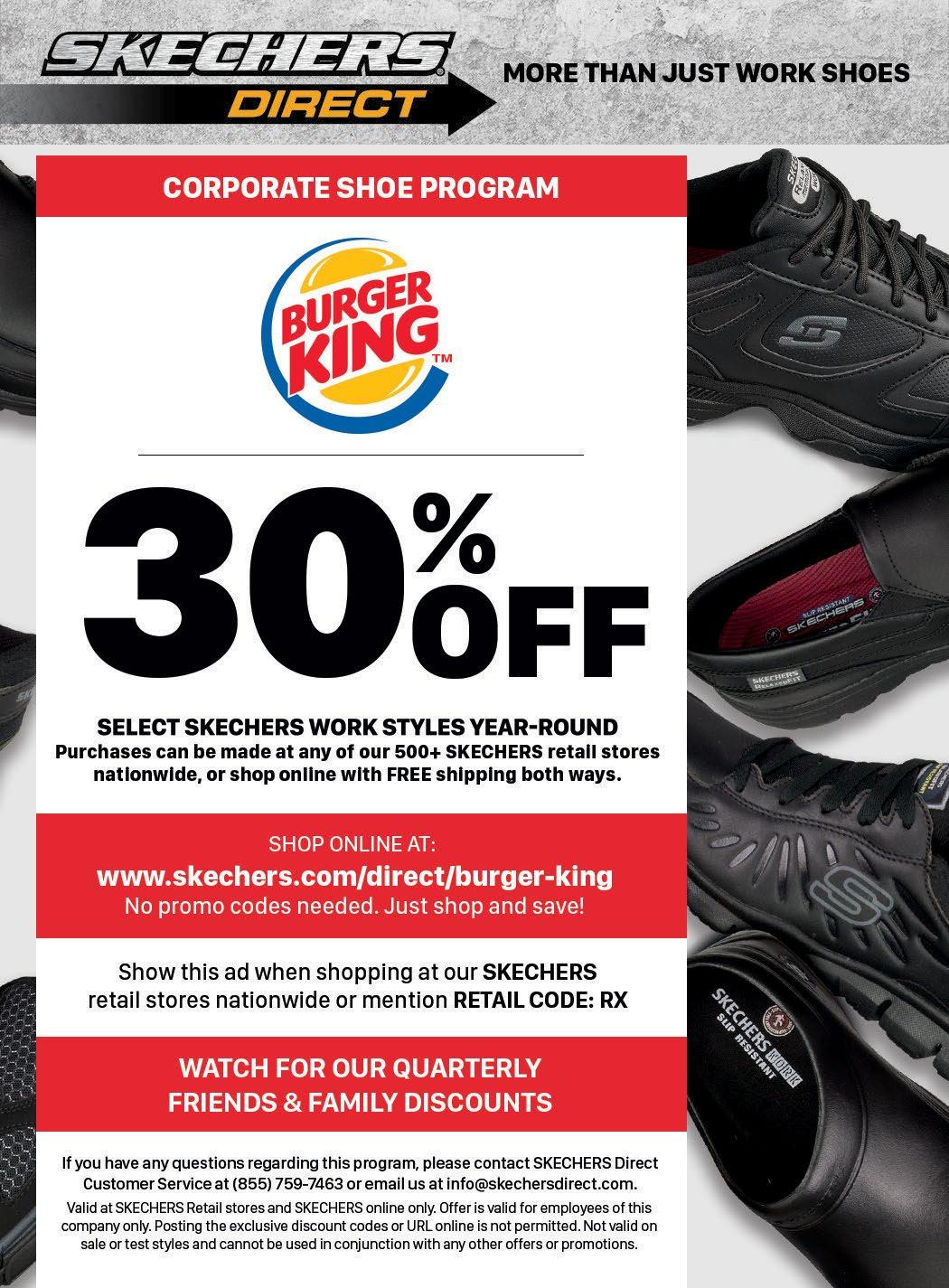

• Reduce risks by securing electrical cords to walls, regularly inspecting chairs and stools for damage, positioning furniture to have a clear traffic area, eliminating furniture with wheels and using wet floor signs.

Implement driver guidelines. If your business owns a vehicle, implement policies and guidelines around acceptable drivers and behaviors while driving.
tips: All drivers should have a valid driver’s license, a clean driving record and should be banned from using their phone while driving.
Prepare for Mother Nature. Implement severe weather plans so you can act quickly in the event of a storm.
tips: For winter weather, obtain proof of insurance from the snow removal company and have your contract reviewed by legal counsel. Treat walkways and parking lots with salt or sand before, during and after a winter storm. Always inspect your building and lot after severe weather. Remove any debris, such as tree limbs or trash. As snow or rain is tracked into your building, keep floors clean and dry, and place wet floor signs where necessary.

Assess safety signage. Your business may already have safety signage that helps keep customers and employees safe.
t ips : Make sure signs are located at point of use and
related directly to the hazard at hand. Reduce visual clutter and distraction by reducing the number of signs in a single area. Take down safety signs that are no longer needed. Replace any signage that is out-of-date, damaged or missing. n
For more risk management tips and information about available coverage to protect your business, contact Lockton Affinity, the co-broker of the Elevanta insurance program. Lockton offers key coverage designed with your insurance requirements in mind. Learn more at Elevanta.LocktonAffinity.com or contact the Lockton Affinity team at Elevanta@LocktonAffinity.com or 844-403-4947.
The Elevanta Insurance Program is administered by Lockton Affinity, LLC d/b/a Lockton Affinity Insurance Brokers LLC in California #0795478. Coverage is subject to actual policy terms and conditions. Policy benefits are the sole responsibility of the issuing insurance company. Coverage may be provided by an excess/surplus lines insurer which is not licensed by or subject to the supervision of the insurance department of your state of residence. Policy coverage forms and rates are not subject to regulation by the insurance department of your state of residence. Excess/Surplus lines insurers do not generally participate in state guaranty funds and therefore insureds are not protected by such funds in the event of the insurer’s insolvency. Elevanta will receive a royalty fee for the licensing of its name and trademarks as part of the insurance program offered to the extent permitted by applicable law.
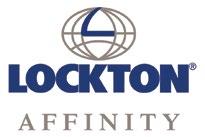
2020 ISSUE 2 | Flame 39 Everything
A market-leading lineup of relevant, delicious foods you can trust—all backed by over 80 years of proven foodservice expertise. simplotfoods.com © 2017 J.R. Simplot Company
good begins with a seed.
Unproductive Worry: Productive WorryVS.
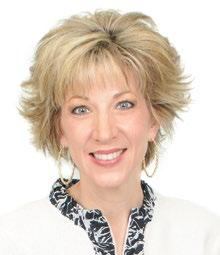

Six Ways to Make Worrying Work for You
We all worry sometimes. Most dictionaries define worry as unrelenting, repetitive and unresolved thoughts about the same topic. But as any deep thinker knows, worrying can sometimes prove productive – especially if you come at a topic from different directions, one at a time, and can actually do something about it. The difficulty often lies in worrying constructively rather than allowing yourself to fall into a spiral of negativity.
To avoid the latter, keep two things in mind: the famous Serenity Prayer, and the difference between productive worry and its unproductive counterpart.
You may recall the Serenity Prayer, which sees use in many contexts, including motivational and productivity events. In fact, you may have heard it so often it’s become a cliché, but this makes it no less helpful if you really consider it carefully:
God, grant me the serenity to accept the things I cannot change,
The courage to change the things I can, And the wisdom to know the difference. Productive worry involves finding ways to change the things you can. Among other things, it is:

1 Proactive. Some might call this term another business cliché, but again, it’s a cliché because it works. If you are worried about something you can get up and start working on, then your worry is productive. If the worrying leaves you inactive because you feel you can do nothing about whatever you are worried about, then it’s useless. Fretting about the weather is unproductive, but if you can move forward and do something about it – say, by combatting climate change – then maybe it’s worth it. Your contribution might seem miniscule, but it is a contribution. On a more realistic scale, worrying about your next
by LAURA STACK
40 Flame | 2020 ISSUE 2
beta test may prompt you to work harder to hit your deadline, just as worrying about your health may get you to the gym.

2




Realistic. Save your worry time for things you can actually accomplish. You’re not going to find a way to erect a space elevator by next week, but you can contribute to the engineering of one that’s going up in 20 years, or to the code for the systems that will control its carriages.












3

Limited. You can’t let worry stop you dead in your tracks for very long. So, if necessary, give yourself a brief time every day to worry, especially about things you can’t change. Fifteen minutes is good. You may find, however, that in time, your worry becomes productive – even for some things you thought you couldn’t change.
4















Informed. Early European settlers in the New World wasted centuries of worry on the toxicity of tomatoes, partly due to their familiarity with the “black sheep” of its extended family –deadly nightshade. Plus, they’d heard reliable reports of aristocrats dropping dead after eating tomatoes. This deprived the general populace of a wonderfully versatile crop for 200 years. But once settlers took native lore seriously and tried them, they realized tomatoes were just peachy. Recent theories about the poisonings point to pewter plates used by the aristocrats. The acids in the tomatoes apparently leached out the alloy’s lead content. (Most people didn’t take lead toxicity seriously until the 1970s.)
5


Problem-based. Anxiety doesn’t dominate productive worry; problem solving is its focus. Unproductive worry is anxiety-based.


6








Focused. Productive worry concentrates on one thing at a time. You require this for planning and preparation, or your planning will devolve into a time-wasting mess. Time management and to-do lists, therefore, are crucial for true productivity.





Walk on Faith
Productive worry is about accepting what you can’t change and moving on, while taking steps to change what you can. It guides you toward productive actions you can take to end or limit your worry. Now, you’ll always worry about some things you can’t do anything about, like family and friends. But work isn’t something to worry yourself to a frazzle over.
It takes a leap of faith to move on from worrying about what you can’t change, but even if such worry can motivate you in a negative sense, you can’t dwell on it without damaging your performance (and sanity). Instead, use productive worry to help you do what you must – prep for a beta, get training, hit a deadline, work toward a promotion – while letting worry about the weekend’s weather or the state of the world float by. If you can do something to change the situation, do it. If you can’t, don’t worry about it, or at least don’t let the worry eat up your productive time. n
LAURA STACK, MBA, CSP, CPAE, aka The Productivity Pro®, gives speeches and seminars on sales and leadership productivity. For over 25 years, she’s worked with Fortune 1000 clients to reduce inefficiencies, execute more quickly, improve output and increase profitability. Laura is the author of seven books, including “Doing the Right Things Right: How the Effective Executive Spends Time.” To invite Laura to speak at your next event, visit www.TheProductivityPro.com.
2020 ISSUE 2 | Flame 41 Nieco® FH94 Flame Broiler The Heart of Your BK® Kitchen www.middleby.com | ordersbk@middleby.com Available on all models! 100% project financing. Contact any Middleby division or sales rep to get started! *Financing based on credit approval. Neither Ascentium Capital nor Middleby is the agent of the other. Ascentium not being the manufacturer, seller or distributor of the property being financed, makes no representation or warranty concerning it. Integrated Oil Management Pitco® 3/2/3 Fryer Blodgett Hoodini™ Ventless Combi Oven A M ONT H FO R THE FIRST SI X M O NTH S FAST FLEXIBLE FINANCING JUST $29 >>> Followed by regular payments for the remainder of the term*
Optimally Manage Cash Flow With a Financial Team
As a franchise owner, you’re constantly juggling priorities ranging from backfilling employees who call off their shift to thinking about your exit plan (someday, right?). If the COVID-19 pandemic has taught us anything, it’s that it takes a team to keep your business surviving and hopefully thriving.
Accountants, payroll specialists, bankers and attorneys might be part of your team and hopefully were invaluable in helping you secure funding from the various COVID-19 relief packages. Another member who should be part of your team is a financial adviser who is experienced in working with franchise owners.
A financial adviser qualified in this way is uniquely positioned to not only help you manage the liquid assets of your business but also efficiently build wealth and enhance the overall financial security of you and your family.
Cash is King?
When your accountant collaborates with an experienced financial adviser, a whole new world of possibilities opens. For example, your

accountant evaluates your short- and long-term cash flow to identify how much cash your business needs and when it will be needed. A financial adviser can then manage the business’s cash using investment strategies that align with the timing of those cash needs, then explore using excess cash to build personal wealth for you as part of a broad financial plan.
by CHARLIE KOCH
Working with franchise owners, I often find that a significant amount of cash is held in the business checking account or some type of interest-bearing account. They often tell me that they like having an abundance of liquidity in the business or that they simply are not sure what else to do with it.
Holding a significant amount of cash isn’t a great idea. First, holding excess cash in accounts under your business’s corporate name leaves it exposed to potential liabilities like lawsuits filed against the business. In addition, the balance of these accounts often exceeds the FDIC limit of $250,000 by a significant margin.
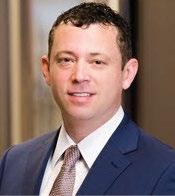
42 Flame | 2020 ISSUE 2
What’s possibly the biggest drawback, however, is that excessive funds aren’t doing much to advance your own goals such as retirement, leaving a legacy or simply building personal wealth outside the value of your business.
A Better Way to Use Cash for the Future
The collaboration between your financial adviser and your CPA results in a timeline of cash expenditures outside of day-to-day expenses. This, coupled with cash-flow trends, will create a clear picture of how cash levels are likely to change over time and how those levels compare with the needs of the business.
Cash needed in the short term should stay in the corporate checking account so that it can be quickly deployed to pay upcoming expenses. Cash that will be needed for longer-term business expenses can be moved to an investment account, titled in the business name, where it can access a larger universe of investments, allowing your financial adviser to tailor a portfolio that strives for a better return on those funds within the timeframe that they’ll be needed. The investment portfolios in these types of accounts are usually more conservative to limit fluctuations in value from the ups and downs of the stock market.
The cash that this analysis indicates will not be needed for business purposes in the short or long term is what we call “excess cash” and, with the business’s needs carefully accounted for, can be allocated to building the business owner’s personal wealth as part of a broad financial plan.
Some of the areas addressed by a broad financial plan include retirement, ensuring that your estate plan is up to date, philanthropic activity, review of insurance coverage, etc. In simple terms, the plan facilitates the building of wealth strategically and

efficiently to help you realize your future aspirations and enhance overall financial security.

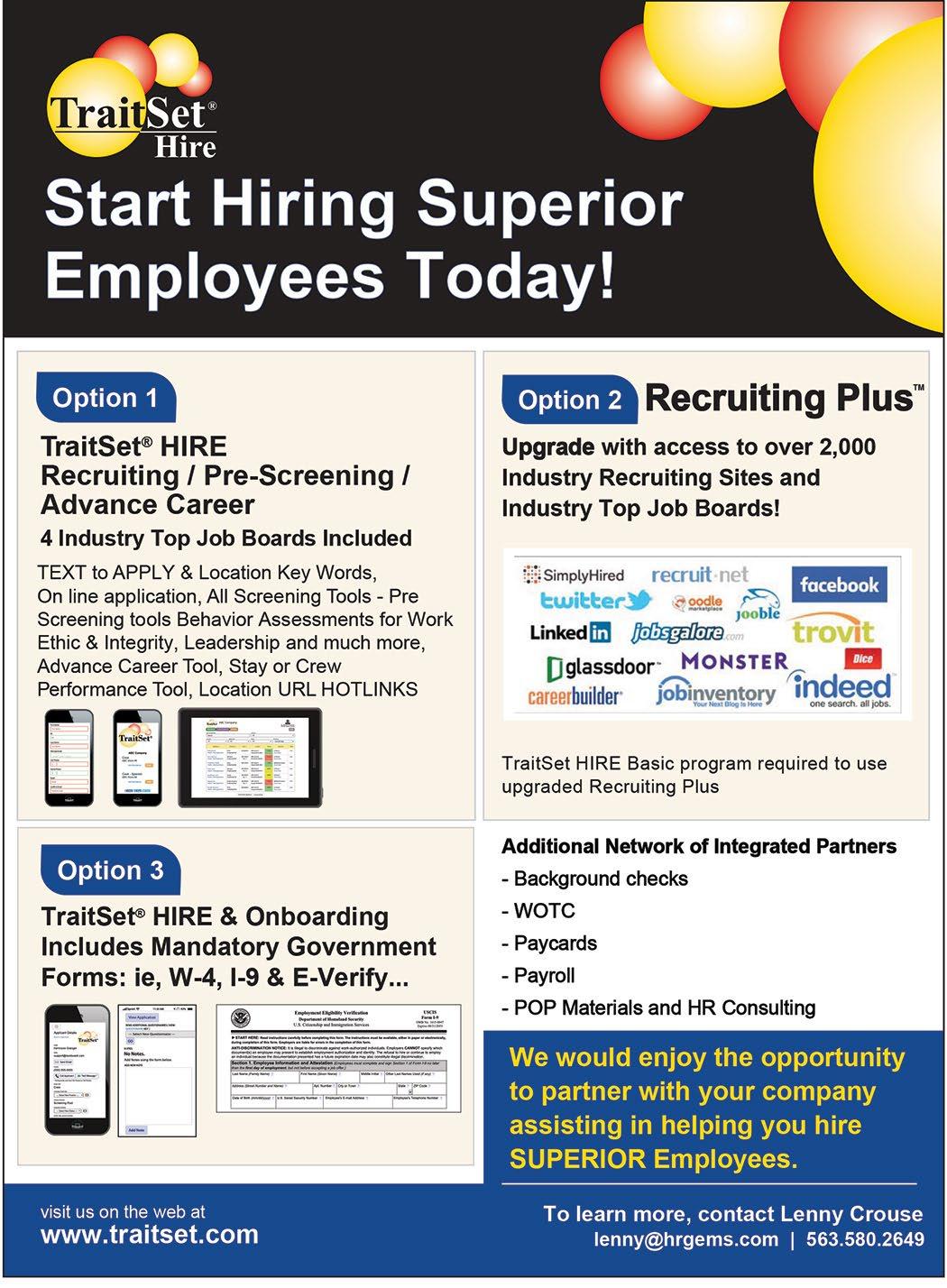
Why Worry? What Can We Learn From the Recent Pandemic?
COVID-19 came out of nowhere and blindsided most of the world. I don’t think anyone ever thought that shutting down the economy to control the spread of a virus, or any other reason for that matter, was a real possibility. The virus and the measures to control it presented business owners with challenges they never thought they’d face.
However, those who had a sound plan going into the pandemic found themselves with far more options than those who didn’t. In the conversations that I’ve had with clients since the start of the pandemic, we’ve discussed questions like: “What’s the best strategy to get money back into the business if we need to? How does this situation change our long-term plan? How can we best position to take advantage of any opportunities that may result from this?” Without a strategic plan and the security that it provides, it’s far easier to fall victim to panic and fear instead of logically thinking through the best way through the situation.
CHARLIE KOCH, CFP®, CPWA®, MBA, is a wealth manager at Prism Financial Group LLC, a related company of Mize Restaurant Group that serves franchisees across the country. Mize Restaurant Group provides accounting, consulting and payroll services to NFA members. He can be reached at charlie@prismfg.com.
2020 R T Iconnec t Xenial Back Office Optimize Shift Staffi Automate Schedulin Near-Real-Time Repo Dashboards & Ale Forecasting Control Food Costs For more information contact: Tom Cheek RTIconnect@xenial.com A Global Payments Company
n


44 Flame | 2020 ISSUE 2 DIRECTORY 2021 NFA Day on the Hill 3 2021 NFA LEAD Conference CS BURGER KING McLAMORESM Foundation 31, 33 mtoscano@rbi.com www.bkmclamorefoundation.org/donate/ Casablanca Design Group 19 470-308-5209 john.harrison@casablancadesign.com DTiQ 19 800-933-8388 www.dtiq.com/products/smartaudits-how-it-works/ Ecolab 21 800-529-5458 ecolab.com/qsrmachinewarewashing Elevanta Health 5 memberservices@elevanta.com elevantahealth.com/nfa Frontline International 9 877-776-1100 www.frontlineii.com Global Building Contractors 37 800-257-9442 www.gbc.llc Gycor International 35 800-772-0660 www.gycorfilters.com Hall Financial 23 866-865-4442 HallFinancialAdvisorsLLC.com J.R. Simplot IF, 39 704-391-8321 www.simplotfoods.com Lancer 6 210-310-7000 Lancerworldwide.com/L-Guard Lockton Affinity 27 844-403-4947 Elevanta.LocktonAffinity.com Keurig Dr Pepper BC 561-236-8123 kelton.graham@kdrp.com Mount Franklin Foods 21 904-923-4053 hospitalitymints.com National Franchise Sales 9 949-428-0492 www.nationalfranchisesales.com Ooma IB 866-464-3026 ooma.com/burgerking Pacific Premier Franchise Capital 11 402-562-1800 ppbifranchise.com rapid! 37 888-828-2270 rapidpaycard.com RSI 29 305-529-3400 www.rsiweb.com SKECHERS 39 855-759-7463 www.skechers.com/direct/burger-king The Coca-Cola Co. 25 800-241-COKE www.coca-cola.com The Hershey Co. 41 636-265-0811 hersheyfoodservice.com The Middleby Corp. 41 ordersbk@middleby.com www.middleby.com TraitSet HIRE 43 563-580-2649 www.traitset.com Tyson Foods 24 410-340-3974 tysonfoodservice.com Welbilt 17 813-504-9262 welbilt.com Xenial 43 rticonnect@xenial.com www.xenial.com *IF=Inside Front, CS=Cover Sheet, IB=Inside Back, BC=Back Cover Advertisers Guide 2020 Editorial Calendar ISSUE AD ARTWORK PUBLICATION DEADLINE DATE 3 Aug. 20 Oct. 9 4 Oct. 22 Dec. 9 Call for Franchisee News FLAME, Issue 3 is due out October 2020. We want to highlight any news or events associated with our members. If you have ideas for potential stories, please contact communications@nfabk.org or 678-797-5165 by Aug. 27. Our editorial staff can assist in writing the story for you.
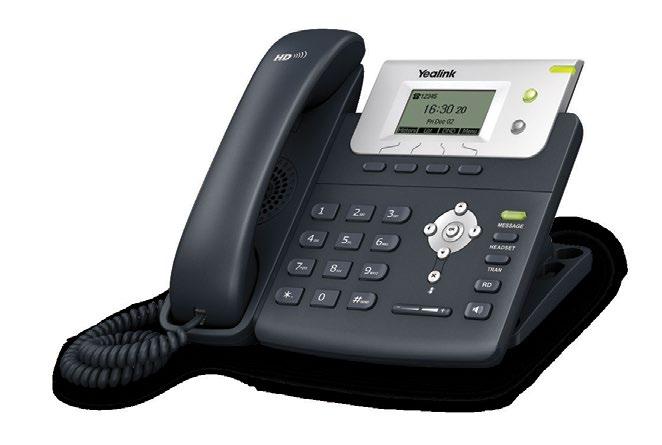
2019 Issue 4 Cut your business phone service bill in half! Sign up by Sept. 30 th. Get a free phone.* 060520KN Get the features designed to help your franchise grow sales and contain costs. With Ooma Office, you’ll get the most reliable, easiest to use, simplest to set-up business phone service in the industry. Reduce your costs Monthly service fee is just $19.95 per user. Each account comes with a main line number, a toll free number, and direct extension to one user. Great features for your franchise! Easily manage employees and locations with extension dialing, mobile app group texting, auto attendants and more. Setup and switching is so easy Do-it-yourself installation sets up in minutes. And you can transfer your existing number free. If you need help, we’re here with 24/7 customer support. *This free phone offer is applicable to Ooma provisioned T21 Restock IP Phone only. Hurry! Call 866-464-3026 or visit ooma.com/burgerking Operate your Burger King on the #1 rated business phone service. • Reduce your monthly phone bill. • Get more features. • Connect with employees and locations easily.
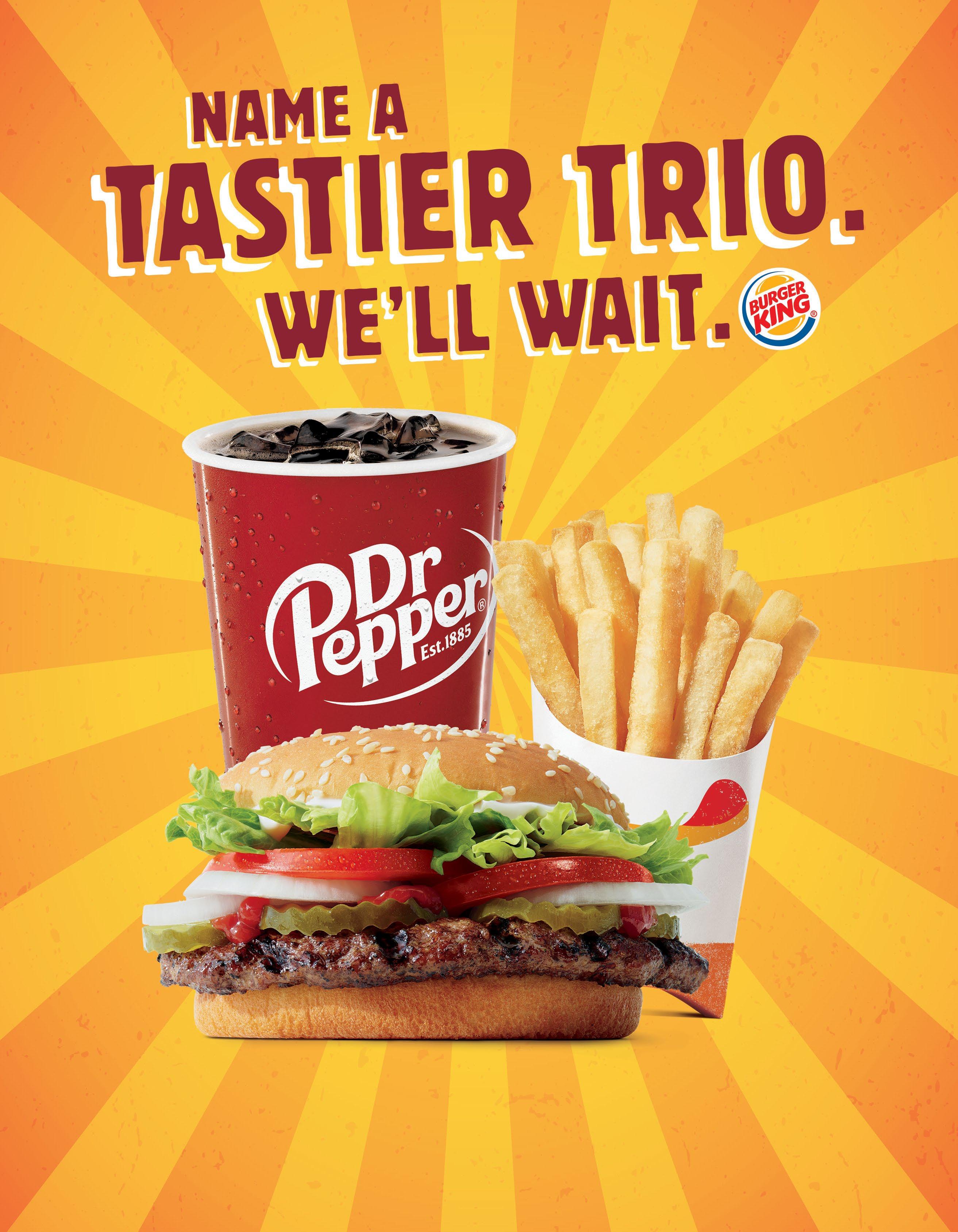
CALL US TODAY! KELTON GRAHAM Vice President 561.236.8123 LARRY FORESEE Team Lead Central 214.618.0787 JOSH HANLEY Team Lead South 770.844.1597 JEFFREY JENRICH Team Lead North 608.318.2661 TRACY KEARNS Team Lead West 951.340.1320 LESLIE McCORMICK Marketing 972.673.6057 DR PEPPER is a registered trademark of Dr Pepper/Seven Up, Inc. ©2019 Dr Pepper/Seven Up, Inc. TM & ©2019 Burger King Corporation. All rights reserved.
























































































































